The MESSENGER

April, 1924


April, 1924
j INCLUDES f
j 1. Richmond College, a College of Liberal Arts for Men. i
i 2. Westhampton College, a College of Liberal Arts for J I Women.
j 3. The T. C. Williams School of Law, a Professional I School of Law, offering the Degree of LL. B.
I4 I I

The Summer School. W. L. Prince, M. A., Director.
W. L . PRINCE, M. A., DEAN
Richmond College for Men is an old and well-endowed College of Liberal Arts, which is recognized everywhere as a Standard American College. Its degrees are accepted at face value in the great graduate and technical schools of America. Its alumni are so widely scattered through the nation that the new graduate immediately joins a large and friendly group of men holding positions of power and influence. The College occupies modern and well-equipped buildings, on a beautiful campus of 150 acres in the western suburbs of Richmond.
MAY LANSFIELD KELLER , PH. D., DEAN
Westhampton College for Women, co-ordinate with Richmond College for Men, is housed in handsome buildings on a campus of 140 acres, separated from the Richmond College campus by a beautiful lake of about nine acres. All degrees are given by the University of Richmond, and those conferred on women are, in all respects, equivalent to those conferred on men. While the two institutions are co-ordinate, they are not co-educational.
J H. BARNETT, JR., LL. B., SECRETARY
Three years required for degree of LL. B. in the Morning Division, four years in the Evening Division. Strong faculty of j seven professors. -Large Library. Moderate Fees. Open to hoth Men and Women. Students who so desire can work their way.
For catalogue, booklet, or views, or other information concerning entrance into any College, address the Dean or Secretary.
F. W. BOATWRIGHT - President
Subscription Price, $I.SO Per Annum
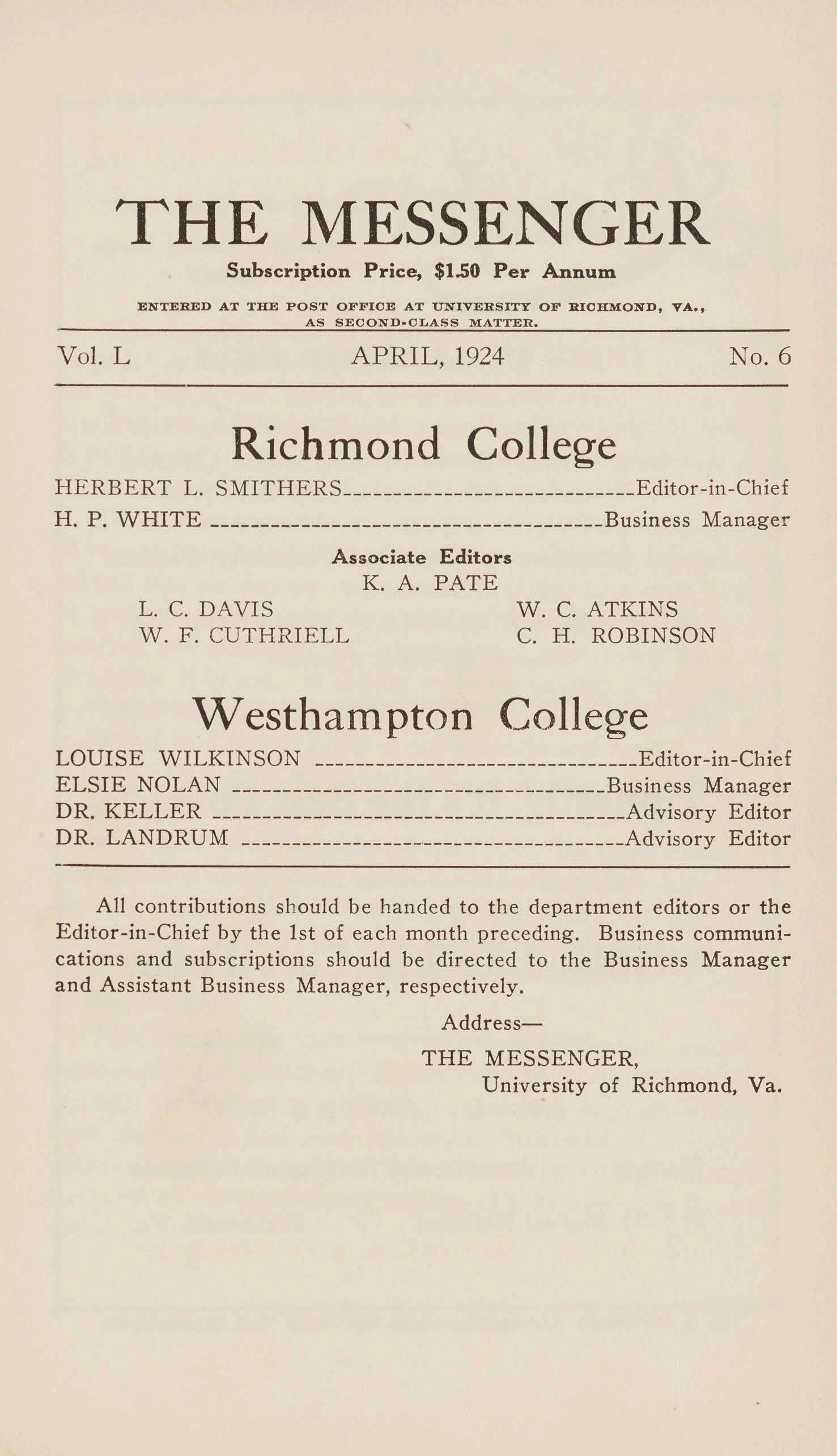
Vol. L
HERBERT L. SMITHERS _____________________________
No. 6
Editor-in-Chief
H. P. WHITE _______________________________________Business Manager
Associate Editors K. A. PATE
L. C. DAVIS
W. C. ATKINS
W. F. CUTHRIELL C. H. ROBINSON
LOUISE WILKINSON ________________________________
Editor-in-Chief
ELSIE NOLAN _____________________________________Business Manager
DR. KELLER _________________________________________Advisory Editor
DR. LANDRUM --------------------------------------Advisory Editor
All contributions should be handed to the department editors or the Editor-in-Chief by the 1st of each month preceding. Business communications and subscriptions should be directed to the Business Manager and Assistant Business Manager, respectively.
Address-
THE MESSENGER, University of Richmond, Va.
419 N. Boulevard
Directly Opposite Battle Abbey
Table D'Hote Breakfast S0c

Table D'Hote Dinner 85c
Luncheon, Afternoon Tea and Evening Service, a la Carte
Tea Room Open Every Evening Until 11 :30 P. M.
Special Attention to Class and Fraternity Dinners
TELEPHONE YOUR ORDERS: BOULEVARD 5074 Prompt, Courteous Attention

With this issue of THE MESSENGERbegins a new management in so far as the Editor-in-Chief is concerned. Mr. Judson Evans, the retiring Editor, proved to be most competent . Certainly no one will deny that he instilled a new life into THE MESSENGER. It shall be the policy of the newly elected Editor-in-Chief to attempt to maintain the high standard set by Mr. Evans.
The outstanding fault, in regard to the publication, is the lack of co-operation on the part of the students. It may seem to some readers that our literary magazine is controlled by a mere handful of students. That is to say, only the writings of a certain few men are ever published. This condition is true in one sense, and in another it is not. It is true in so far as only a few students ever contribute to THE MESSENGER. But the charge that it is controlled by a special group is unwarranted and untrue.
It is a deploring fact that every month the Editor is forced to publish the writings of the same few men. But who is responsible for this? Is it THE MESSENGER?No ; the responsibility for this condition does not fall upon THE MESSENGER,but rather upon the entire student body. There are perhaps many students on the campus whd can write but don't take the trouble to do so. It is up to these students to write and give THE MESSENGERthe benefit of their abilities.
THE MESSENGER,since it is a student publication, should be representative of the literary attainment of the whole college. This can only be realized by everyone co-operating by contributing to THE MESSENGERtheir very best work. Next month let everyone who can write do so and give THE MESSENGER a chance to publish the work of various different authors if it be deserving of publication. H. L. S.

LESLIE L. JONES
According to Samuel Johnson, William Shakespeare was a scoundrel. Not, perhaps, a complete scoundrel, nor an habitual one; but, nevertheless, a scoundrel. For William Shakespeare was guilty of patriotism, guilty of patriotism in its vilest, most vicious form, and "Patriotism," said the crusty old pensioner of No. 10 Bolt Court, "patriotism, sir, is the refuge of a scoundrel."
Of course, now, this epigram was not discharged directly at the haloed head of Gentle Will, nor it is at all certain that the distinguished Doctor himself had ever observed wherein the Bard so unpardonably sinned. That Shakespeare did sin, however, upon the side of jingoism, becomes immediately apparent when we turn to the First Part of King Henry the Sixth. Glancing into this work, let us inspect the evidence, and later, if possible, endeavor to find some excuse for the dramatist's amazing behavior.
The play opens with the funeral procession of that tremendous, God-fearing monarch, Henry the Fifth. As the Victor of Agincourt lies cold within his casket, and earth-worms smilingly lick their chops, distressing news arrives from France, from that France through whose fertile fields this mouldering bit of marl had one-time trailed a puissant pike. Talbot, it seems, is captured; and the siege of Orleans goes forward not one jot. And thereupon, beside the royal bier, mourning brothers and uncles of the dead man swear to maintain his foreign conquests, and bustle furiously about to unleash more dogs of war upon Normandy.
This, in the second scene. The second sets us down before Orleans. Here we find, that, in spite of some minor successes, things are none too bright in the camp of Charles, Dauphin of France. Mais attendez, help is at hand ! Into the royal presence swaggers a maid of surpassing loveliness, clothed in armour white, and trundling an ancient, keen-edged sword. Plucking the Prince from amongst the assembled lords, she addresses him in a straight-

forward, two-fisted fashion. She has come, says she, to save La Belle France. Answers the Dauphin:
"Thou hast astonish ed me with thy high terms: Only this proof I'll of thy valour make , In single combat thou shalt buckle with me, And if thou v anquishest thy words are true; Oth erwise I renounce all confidence."
This plea ses the lady va stly, and she ups with her flashing brand. "Th en com e," shouts Charles, "o ' God's nam e ; I fear no women." "And while I liv e," retorts the Amazon, 'TU n' er fly from a 1nan."
So they wield me their swords right curiously, and the Prince is vanquished. Vanqui shed in more ways than one. No sooner has he scrambled up from out the dust than he exclaims:
"Impati ently I burn with thy d esire; My heart and hands thou hast at once subdued. Exc ellent Puc elle, if they name be so, L et me thy servant and not sover eign be: 'Tis the French Dauphin sueth to thee thus."
But, "No," says Joan La Pucelle ( commonly called, says Mr. Shakespeare, Joan of Arc), "No,
I must not yi eld to any rit es of love, For my profession's sacred from above: When I have chased all thy foes from hence Th en will I think upon a recompense."
Skipping the innumerable details of military activity with which this play abounds-sorties, retreats, alarums, and so forth-let us take a few brief glances at this unusual young person, Mr. Shakespeare's own Jeanne d'Arc. Throughout the entire piece she remains consistently the same; aggressive, turbulent, brazen, a sort of disquieting, mediaeval flapper. At the battle of Rouen she bandies, taunts and sword thrusts with the fiery Talbot in the manner of a hard-boiled first sergeant of Marines. And her Ian-
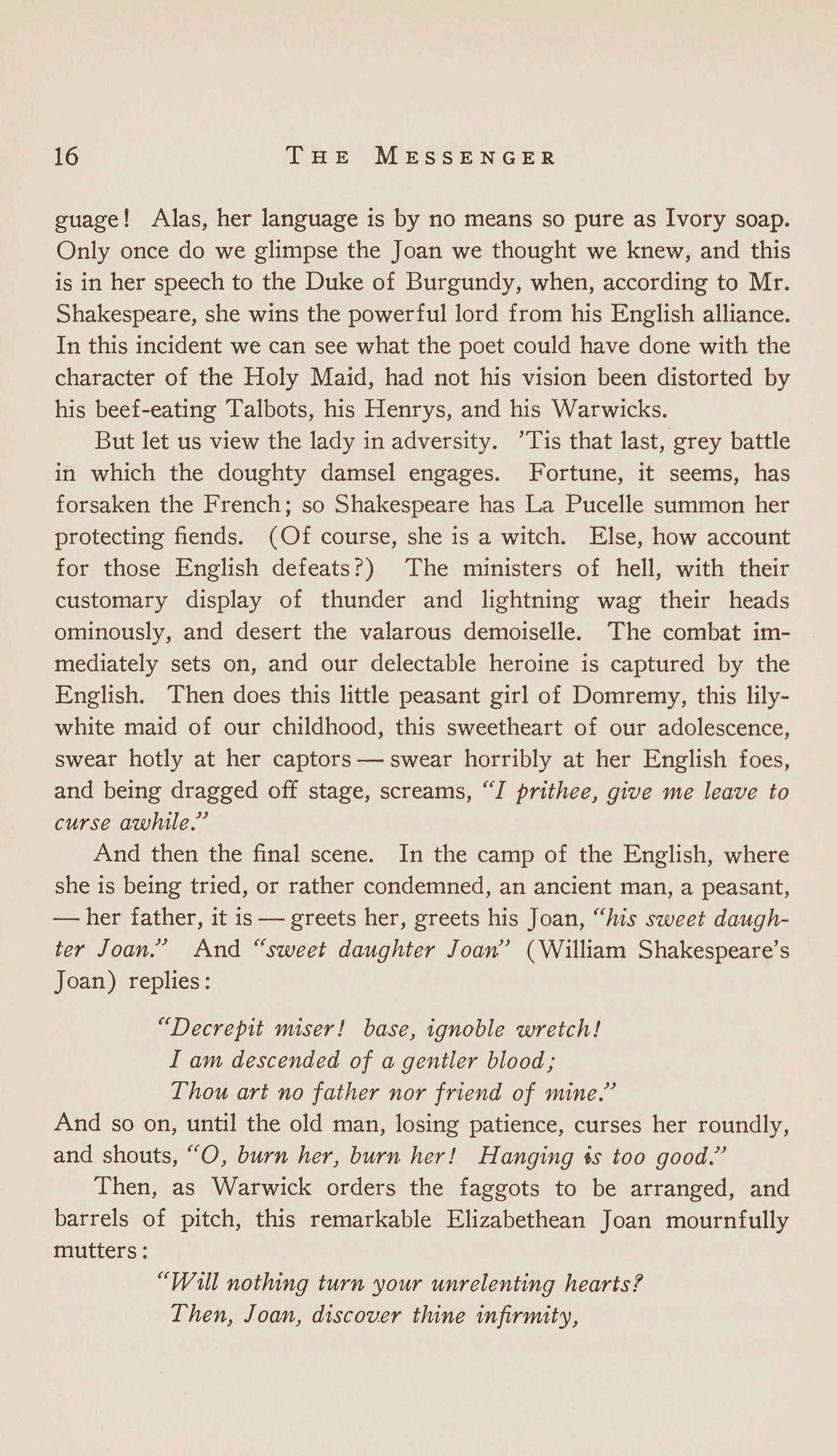
guage ! Alas, her language is by no means so pure as Ivory soap. Only once do we glimpse the Joan we thought we knew, and this is in her speech to the Duke of Burgundy, when, according to Mr. Shakespeare, she wins the powerful lord from his English alliance. In this incident we can see what the poet could have done with the character of the Holy Maid, had not his vision been distorted by his beef-eating Talbots, his Henrys, and his Warwicks.
But let us view the lady in adversity. 'Tis that last, grey battle in which the doughty damsel engages. Fortune, it seems, has forsaken the French; so Shakespeare has La Pucelle summon her protecting fiends. ( Of course, she is a witch. Else, how account for those English defeats?) The ministers of hell, with their customary display of thunder and lightning wag their heads ominously, and desert the valarous demoiselle. The combat immediately sets on, and our delectable heroine is captured by the English. Then does this little peasant girl of Domremy, this lilywhite maid of our childhood, this sweetheart of our adolescence, swear hotly at her captors -swear horribly at her English foes, and being dragged off stage, screams, "I prithee, give me leave to curse awhile."
And then the final scene. In the camp of the English, where she is being tried, or rather condemned, an ancient man, a peasant, -her father, it is-greets her, greets his Joan, "his sweet daughter Joan." And "sweet daughter Joan" (William Shakespeare's Joan) replies :
"Decrepit miser! base, ignoble wretch!
I am descended of a gentler blood; Thou art no father nor friend of mine."
And so on, until the old man, losing patience, curses her roundly, and shouts, "0, burn her, burn her! Hanging is too good."
Then, as Warwick orders the faggots to be arranged, and barrels of pitch, this remarkable Elizabethean Joan mournfully mutters:
"Will nothing turn your unrelenting hearts? Then, Joan, discover thine infirmity,
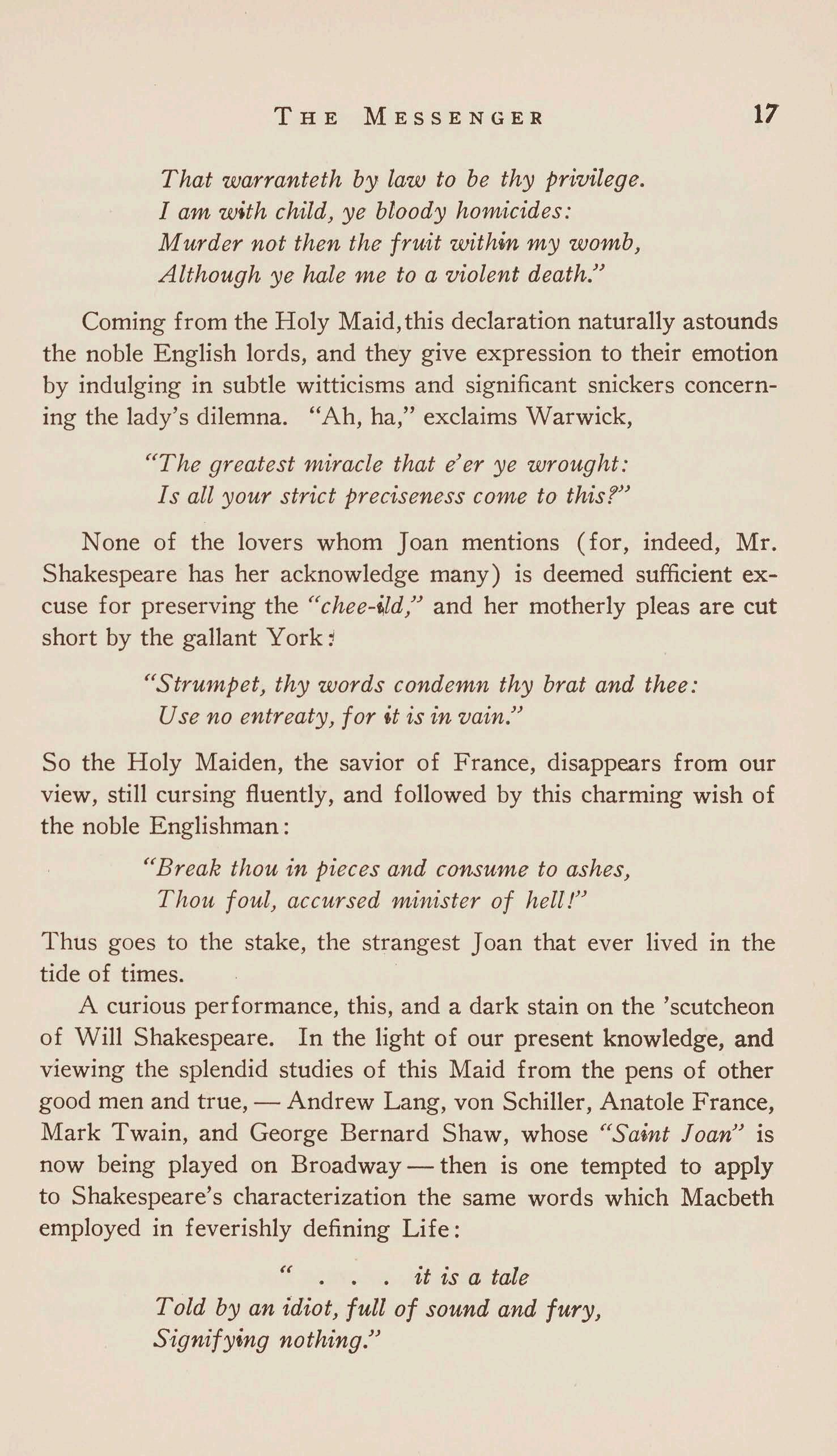
That warranteth by law to be thy privilege. I am with child, ye bloody homicides: Murder not then the fruit withi.n my womb, Although ye hale me to a violent death."
Coming from the Holy Maid, this declaration naturally astounds the noble English lords, and they give expression to their emotion by indulging in subtle witticisms and significant snickers concerning the lady's dilemna. "Ah, ha," exclaims Warwick,
"The greatest miracle that e'er ye wrought: Is all your strict preciseness come to this?"
None of the lovers whom Joan mentions (for, indeed, Mr. Shakespeare has her acknowledge many) is deemed sufficient excuse for preserving the "chee-~ld," and her motherly pleas are cut short by the gallant York j
"Strumpet, thy words condemn thy brat and thee: Use no entreaty, for •t is in vain."
So the Holy Maiden, the savior of France, disappears from our view, still cursing fluently, and followed by this charming wish of the noble Englishman:
"Break thou in pieces and consume to ashes, Thou foul, accursed minister of hell!"
Thus goes to the stake, the strangest Joan that ever lived in the tide of times.
A curious performance, this, and a dark stain on the 'scutcheon of Will Shakespeare. In the light of our present knowledge, and viewing the splendid studies of this Maid from the pens of other good men and true, -Andrew Lang, von Schiller, Anatole France, Mark Twain, and George Bernard Shaw, whose "Saint Joan" is now being played on Broadway-then is one tempted to apply to Shakespeare's characterization the same words which Macbeth employed in feverishly defining Life:
" . it is a tale Told by an idiot, full of sound and fury, Signifying nothing."

And yet, perhaps, this astonishing portrait does, at least, prove one thing; namely, that William Shakespeare, artist that he was, kept ever one eye on the box-office. This is the kindest interpretation we can put on this Joan of Arc episode. I cannot readily conceive of Shakespeare, arch-Elizabeathean as he was, succumbing to such a tin-horn type of patriotism as is here displayed. He is not always ungenerous to the enemy, to the French, that is. In fact, he is usually exceptionally fair ; only with Joan did he overshoot himself. And I like to believe that he indulged in this queer bit of mud-slinging because his clients demanded it. They were a robust, flag-waving folk, those customers of his, those sons of Elizabeth, with their Virgin Queen sassing half the crowned heads of Europe; sweeping the Dons from off the seas; bursting with the pride of an awakening national consciousness a stalwart people, stout trencher men, deep guzzlers, living sixty seconds to every minute. And though the spirit for which Britain has since become notorious - the spirit of fair play-did not then greatly flourish, yet it was not difficult to give the Monsieurs their due. For, indeed, up to the advent of Joan La Pucelle the islanders had consistently walloped the Frenchmen, and one is always generous, you know, to a defeated opponent. And here we uncover the sin of La Pucelle; she refused to be defeated. She was not that kind of a girl. It was Joan of Arc who turned to naught the heroic sweatings of the ineffable Henry Fifth. It was Joan of Arc who handed the visitors their tin hats and showed them to the Channel ports. It was Joan of Arc that jolly well licked an English army. And it was this that choked our ruddy Elizabetheans. Their great-grandfathers, using fire, had failed to subdue the shepherd lass from Lorraine; so they must needs employ tools more poignantly cruel: words - biting words, bitter words, uncomely words. And what could not be consummated in Rouen market place, must needs be attempted upon the boards of the Globe; and shame it is that ever Will Shakespeare put his hand to such a sordid business.
Still, in all fairness to the poet, we must not overlook one other aspect of this question. Did Shakespeare, in his youth, ever study

history? If so, we can almost find him an alibi. For indeed, after inspecting the history texts of this present Twentieth Century, who , with justice, can hold him responsible for notions acquired from those of the Sixteenth?
And then, too, perhaps we can extract a lesson from this misdemeanor of William Shakespeare. Contrasting the Elizabethean opinion of Joan of Arc with the attitude of the present-day Englishman -with the attitude of the world, in fact -does not one feel that, possibly, it is a bit premature, at the present moment, to specify the exact color of any man's soul? Especially one's contemporaries. As for instance, that of Eugene Debs, or Leon Trotsky, or even William of Hohenzollern.
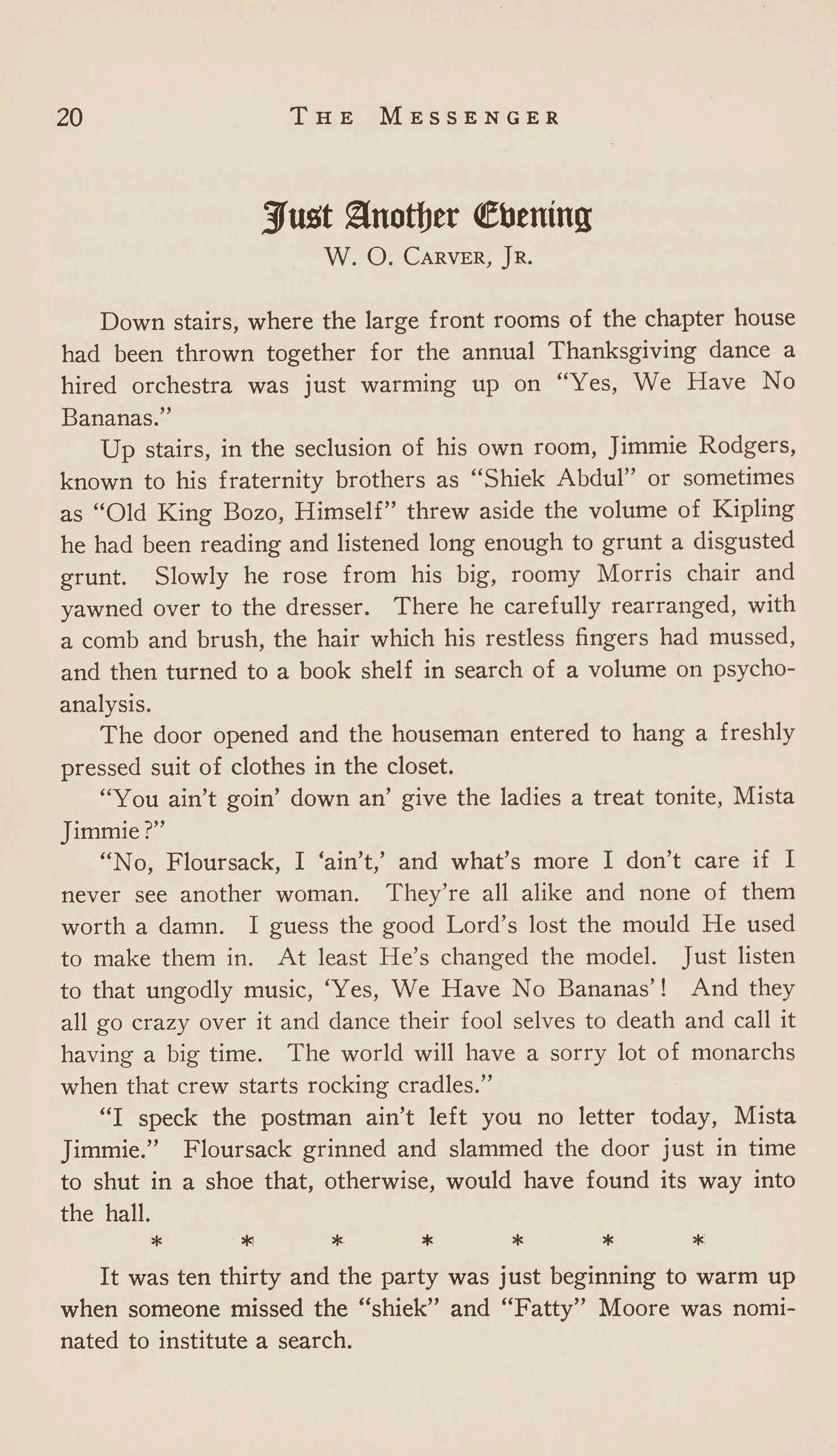
W. 0. CARVER, JR.
Down stairs, where the large front rooms of the chapter house had been thrown together for the annual Thanksgiving dance a hired orchestra was just warming up on "Yes, We Have No Bananas."
Up stairs, in the seclusion of his own room, Jimmie Rodgers, known to his fraternity brothers as "Shiek Abdul" or sometimes as "Old King Bozo, Himself" threw aside the volume of Kipling he had been reading and listened long enough to grunt a disgusted grunt. Slowly he rose from his big, roomy Morris chair and yawned over to the dresser. There he carefully rearranged, with a comb and brush, the hair which his restless fingers had mussed, and then turned to a book shelf in search of a volume on psychoanalysis.
The door opened and the houseman entered to hang a freshly pressed suit of clothes in the closet.
"You ain't goin' down an' give the ladies a treat tonite, Mista Jimmie?"
"No, Floursack, I 'ain't,' and what's more I don't care if I never see another woman. They're all alike and none of them worth a damn. I guess the good Lord's lost the mould He used to make them in. At least He's changed the model. Just listen to that ungodly music, 'Yes, We Have No Bananas'! And they all go crazy over it and dance their fool selves to death and call it having a big time. The world will have a sorry lot of monarchs when that crew starts rocking cradles."
"I speck the postman ain't left you no letter today, Mista Jimmie." Floursack grinned and slammed the door just in time to shut in a shoe that, otherwise, would have found its way into the hall.
* * * * * *
It was ten thirty and the party was just beginning to warm up when someone missed the "shiek" and "Fatty" Moore was nominated to institute a search.
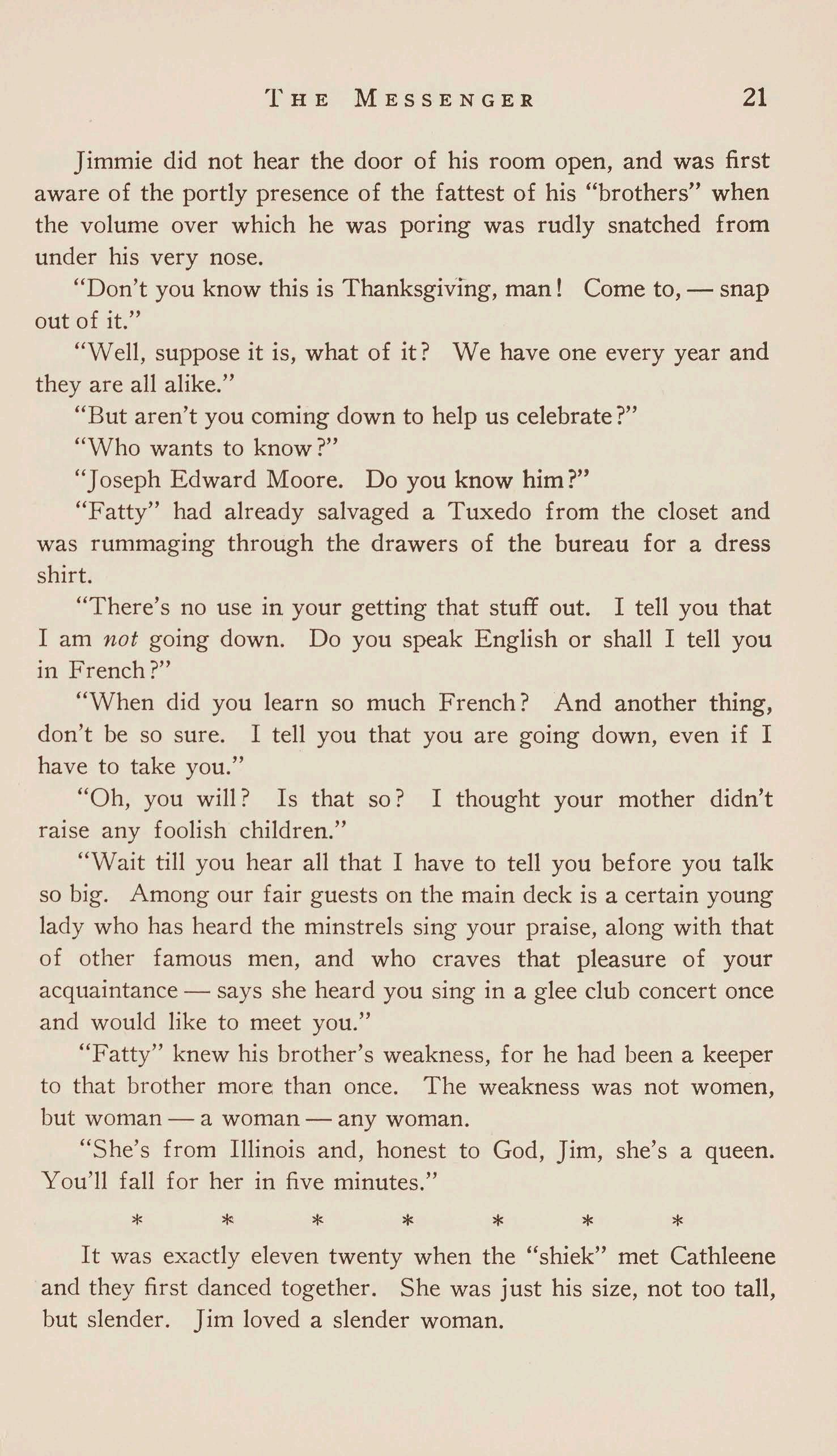
Jimmie did not hear the door of his room open, and was first aware of the portly presence of the fattest of his "brothers" when the volume over which he was poring was rudly snatched from under his very nose.
"Don't you know this is Thanksgiving, man! Come to, -snap out of it."
"Well, suppose it is, what of it? We have one every year and they are all alike."
"But aren't you coming down to help us celebrate?"
"Who wants to know?"
"Joseph Edward Moore. Do you know him?"
"Fatty" had already salvaged a Tuxedo from the closet and was rummaging through the drawers of the bureau for a dress shirt.
"There's no use in your getting that stuff out. I tell you that I am not going down. Do you speak English or shall I tell you in French?"
"When did you learn so much French? And another thing, don't be so sure. I tell you that you are going down, even if I have to take you."
"Oh, you will? Is that so? I thought your mother didn't raise any foolish children."
"Wait till you hear all that I have to tell you before you talk so big. Among our fair guests on the main deck is a certain young lady who has heard the minstrels sing your praise, along with that of other famous men, and who craves that pleasure of your acquaintance - says she heard you sing in a glee club concert once and would like to meet you."
"Fatty" knew his brother's weakness, for he had been a keeper to that brother more than once. The weakness was not women, but woman - a woman - any woman.
"She's from Illinois and, honest to God, Jim, she's a queen. You ' ll fall for her in five minutes."
* * * * * * *
It was exactly eleven twenty when the "shiek" met Cathleene and they first danced together. She was just his size, not too tall, but slender. Jim loved a slender woman.
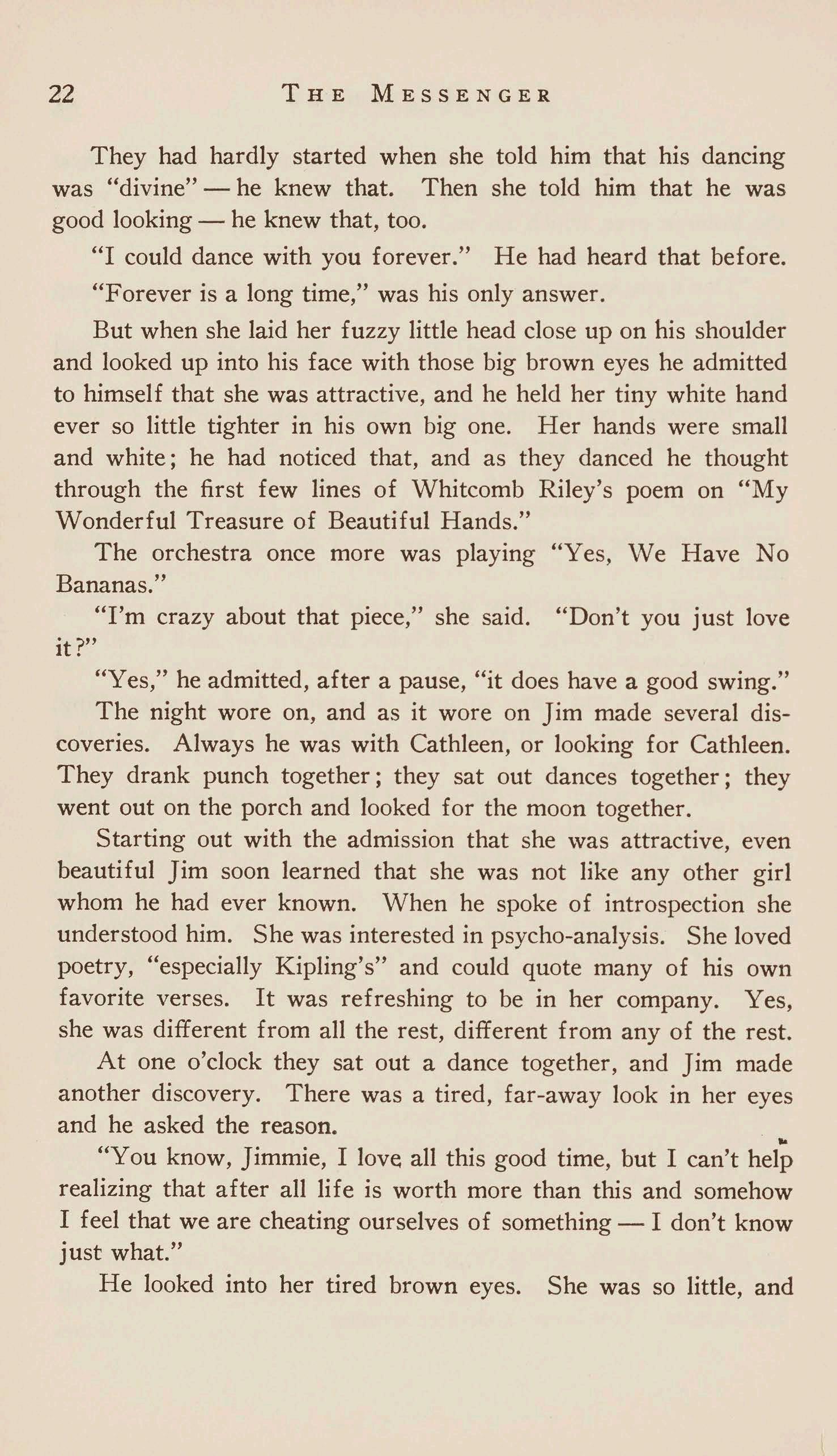
They had hardly started when she told him that his dancing was "divine" -he knew that. Then she told him that he was good looking -he knew that, too.
"I could dance with you forever." He had heard that before. "Forever is a long time," was his only answer.
But when she laid her fuzzy little head close up on his shoulder and looked up into his face with those big brown eyes he admitted to himself that she was attractive, and he held her tiny white hand ever so little tighter in his own big one. Her hands were small and white; he had noticed that, and as they danced he thought through the first few lines of Whitcomb Riley ' s poem on "My Wonderful Treasure of Beautiful Hands."
The orchestra once more was playing "Yes, We Have No Bananas."
"I'm crazy about that piece," she said. "Don't you just love it?"
"Yes," he admitted, after a pause, "it does have a good swing."
The night wore on, and as it wore on Jim made several discoveries. Always he was with Cathleen, or looking for Cathleen. They drank punch together ; they sat out dances together ; they went out on the porch and looked for the moon together.
Starting out with the admission that she was attractive, even beautiful Jim soon learned that she was not like any other girl whom he had ever known. When he spoke of introspection she understood him. She was interested in psycho-analysis. She loved poetry, "especially Kipling's" and could quote many of his own favorite verses. It was refreshing to be in her company. Yes, she was different from all the rest, different from any of the rest . At one o'clock they sat out a dance together, and Jim made another discovery. There was a tired, far-away look in her eyes and he asked the reason.
..
"You know, Jimmie, I love all this good time, but I can't help realizing that after all life is worth more than this and somehow I feel that we are cheating ourselves of something -I don't know just what."
He looked into her tired brown eyes. She was so little, and
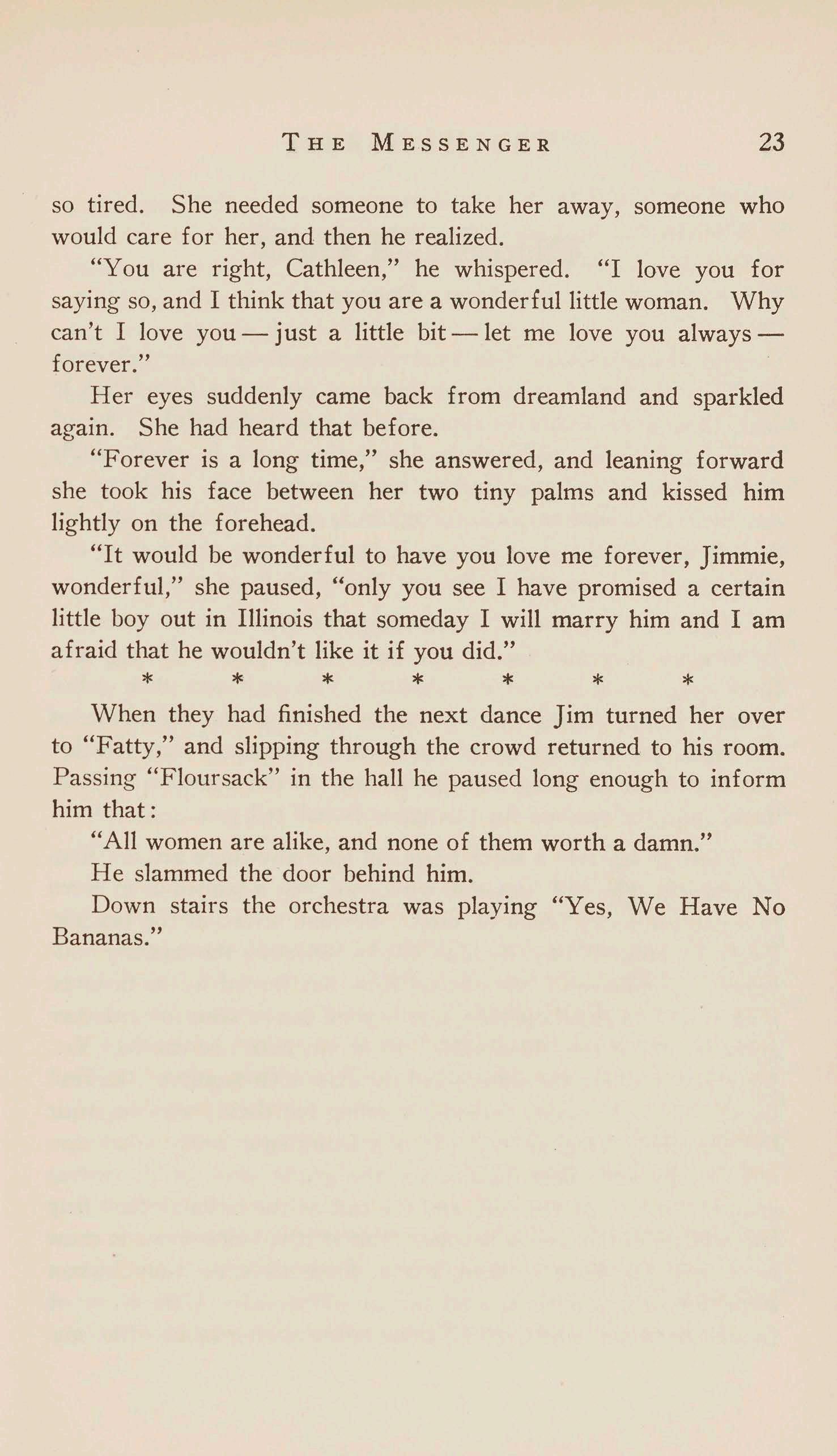
so tired. She needed someone to take her away, someone who would care for her, and then he realized.
"You are right, Cathleen," he whispered. "I love you for saying so, and I think that you are a wonderful little woman. Why can't I love you -just a little bit-let me love you alwaysforever."
Her eyes suddenly came back from dreamland and sparkled again. She had heard that before.
"Forever is a long time," she answered, and leaning forward she took his face between her two tiny palms and kissed him lightly on the forehead.
"It would be wonderful to have you love me forever, Jimmie, wonderful," she paused, "only you see I have promised a certain little boy out in Illinois that someday I will marry him and I am afraid that he wouldn't like it if you did."
When they had finished the next dance Jim turned her over to "Fatty," and slipping through the crowd returned to his room. Passing "Floursack" in the hall he paused long enough to inform him that:
"All women are alike, and none of them worth a damn."
He slammed the door behind him.
Down stairs the orchestra was playing "Yes, We Have No Bananas."
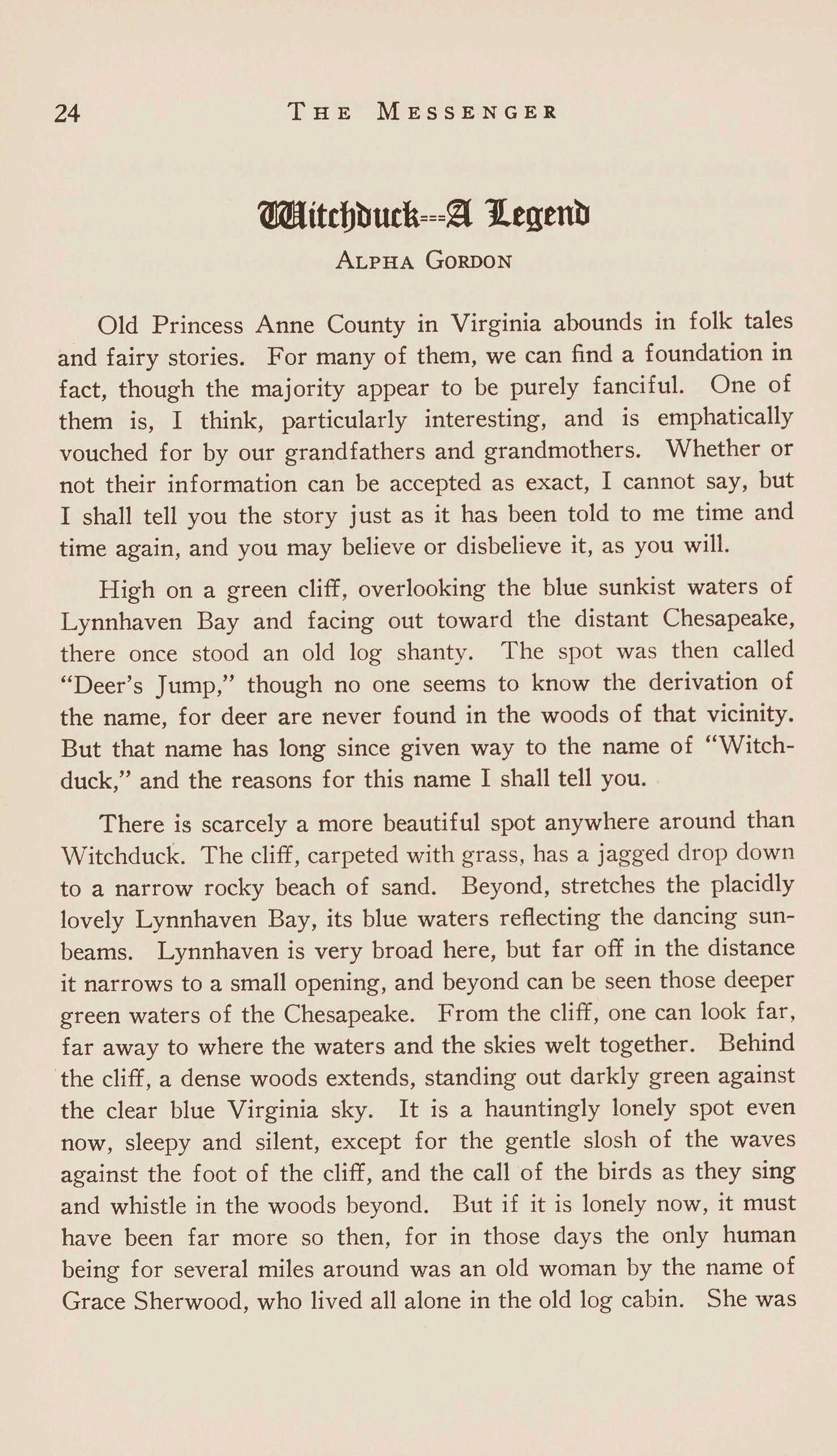
ALPHA GORDON
Old Princess Anne County in Virginia abounds in folk tales and fairy stories. For many of them, we can find a foundation in fact, though the majority appear to be purely fanciful. One of them is, I think, particularly interesting, and is emphatically vouched for by our grandfathers and grandmothers. Whether or not their information can be accepted as exact, I cannot say, but I shall tell you the story just as it has been told to me time and time again, and you may believe or disbelieve it, as you will.
High on a green cliff , overlooking the blue sunkist waters of Lynnhaven Bay and facing out toward the distant Chesapeake, there once stood an old log shanty. The spot was then called "Deer's Jump," though no one seems to know the derivation of the name, for deer are never found in the woods of that vicinity. But that name has long since given way to the name of "Witchduck," and the reasons for this name I shall tell you.
There is scarcely a more beautiful spot anywhere around than Witchduck. The cliff, carpeted with grass, has a jagged drop clown to a narrow rocky beach of sand. Beyond, stretches the placidly lovely Lynnhaven Bay, its blue waters reflecting the dancing sunbeams. Lynnhaven is very broad here, but far off in the distance it narrows to a small opening, and beyond can be seen those deeper green waters of the Chesapeake. From the cliff, one can look far, far away to where the waters and the skies welt together. Behind the cliff, a dense woods extends, standing out darkly green against the clear blue Virginia sky. It is a hauntingly lonely spot even now, sleepy and si lent , except for the gentle slosh of the waves against the foot of the cliff, and the call of the birds as they sing and whistle in the woods beyond. But if it is lonely now, it must have been far more so then, for in those days the only human being for several miles around was an old woman by the name of Grace Sherwood, who lived all alone in the old log cabin. She was
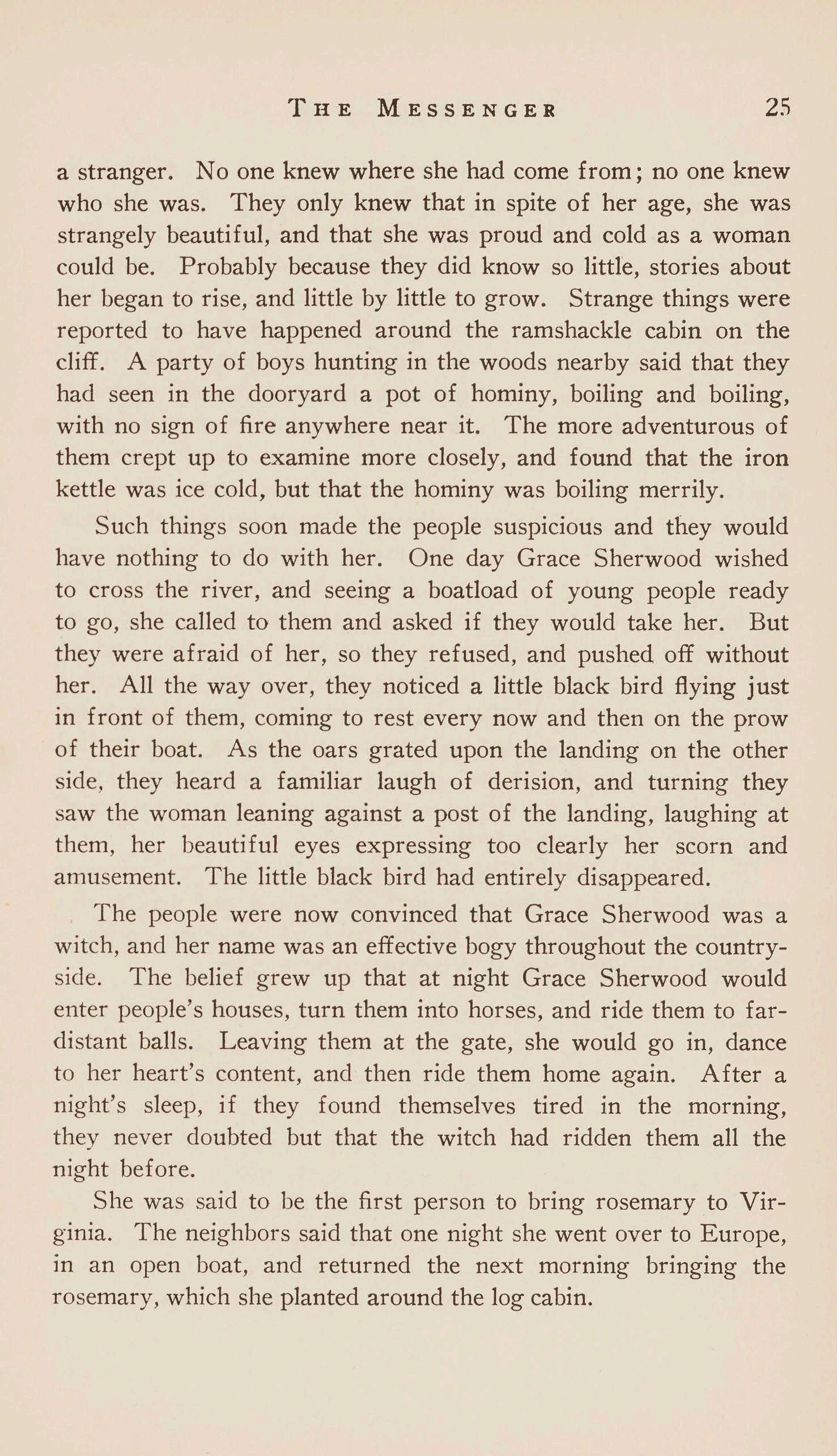
a stranger. No one knew where she had come from; no one knew who she was. They only knew that in spite of her age, she was strangely beautiful, and that she was proud and cold as a woman could be. Probably because they did know so little, stories about her began to rise, and little by little to grow. Strange things were reported to have happened around the ramshackle cabin on the cliff. A party of boys hunting in the woods nearby said that they had seen in the dooryard a pot of hominy, boiling and boiling, with no sign of fire anywhere near it. The more adventurous of them crept up to examine more closely, and found that the iron kettle was ice cold, but that the hominy was boiling merrily.
Such things soon made the people suspicious and they would have nothing to do with her. One day Grace Sherwood wished to cross the river, and seeing a boatload of young people ready to go, she called to them and asked if they would take her. But they were afraid of her, so they refused, and pushed off without her. All the way over, they noticed a little black bird flying just in front of them, coming to rest every now and then on the prow of their boat. As the oars grated upon the landing on the other side, they heard a familiar laugh of derision, and turning they saw the woman leaning against a post of the landing, laughing at them, her beautiful eyes expressing too clearly her scorn and amusement. The little black bird had entirely disappeared.
The people were now convinced that Grace Sherwood was a witch, and her name was an effective bogy throughout the countryside. The belief grew up that at night Grace Sherwood would enter people's houses, turn them into horses, and ride them to fardistant balls. Leaving them at the gate, she would go in, dance to her heart's content, and then ride them home again. After a night's sleep, if they found themselves tired in the morning, they never doubted but that the witch had ridden them all the night before.
She was said to be the first person to bring rosemary to Virginia. The neighbors said that one night she went over to Europe, in an open boat, and returned the next morning bringing the rosemary, which she planted around the log cabin.

Tales of such a kind grew and multiplied, and so finally, both because of their fear of her and of their jealousy of her beauty, the people had her arrested and brought to trial as a witr.b. She was found guilty, and sentenced to be ducked in the Lynnhaven until she was drowned. When they tried to carry out the sentence, they found it not at all the easy thing they had expected, for every time she was ducked, she came up again unharmed. They tied a heavy millstone about her neck , but even this did no good, for, millstone and all, she bobbed up again, her mocking laughter echoing and re-echoing over the quiet waters. Finally someone conceived the idea of tying a Bible around her neck. This was done and the beautiful Grace Sherwood sank beneath the silent blue waters to rise no more. But even in death she had her vengeance, for she had predicted that if they should succeed in drowning her, a terrible storm would arise. Her prophecy came true, for immediately afterward storm clouds began to gather, and all that night, and all the next day, there raged a storm more terrible than any seen, before or after, in that vicinity. Trees blew down, the waters rose so high that the houses on the shore were washed away. Many people who had come to see the ducking were killed by the falling trees, or drowned in the swirling waters as they tried to cross the river to their homes.
So ended the life of Grace Sherwood. Her trial and sentence are recorded in the Princess Anne Court House, and may to this day be seen by anyone. As for the truth of the other storiesthe high green silent cliff of Witchduck tells no tales.

MARY PEPLE
Gravest excitement filled the small town of Pheno and the outlying country districts for ten miles around. The usual game of horse shoes was suspended, while the players gathered in a small group to talk in low tones. The checkerboard at the general merchandise store rested for a whole day, for the first time in years. The children stopped playing and gathered around the various groups, drinking in the news so they could run out and tell all the newcomers who might not have been informed of the miracle.
However, the news had spread far. Five miles from Pheno the blackest nigger sat between the onion rows and passed her judgment on the situation. A'nt Lucy was too fat to stoop, so she sat as she weeded onions, covering a square yard of territory if not more. She sat at the ends of the rows, as it was rather difficult to sit between. Her ten black little grandchildren and daughter went nimbly up and down the rows, making scarcely any noise, so as to hear A'nt Lucy's version of the news.
"I knowed dem po' house folks wan' no good. I knowed it. I don tole you so 'fore dis, ain' I, Cora?"
"You sho did. They ain' never had no religion. They ain' never been to church."
"Well, I reckon they'll set up and git some now. Yestiddy a'ternoon one o' dem po' house fellers wuz cuttin' down a tree. 'Twuz a great, big, tall oak, and when it fell down dar on de groun' what do you s'pose dey foun' in de top o' de tree?" A'nt Lucy paused and wiped the perspiration from her slick, spacious face. Her listeners gathered closer. All the grandchildren hung their mouths wide open to hear better.
"Dey saw de han'work o' Gawd hisself."
All ten grandchildren rolled their eyes. Nobody heeded the hot sun except A'nt Lucy, who mopped her streaming brow at intervals with the upper part of a very dirty sleeve.
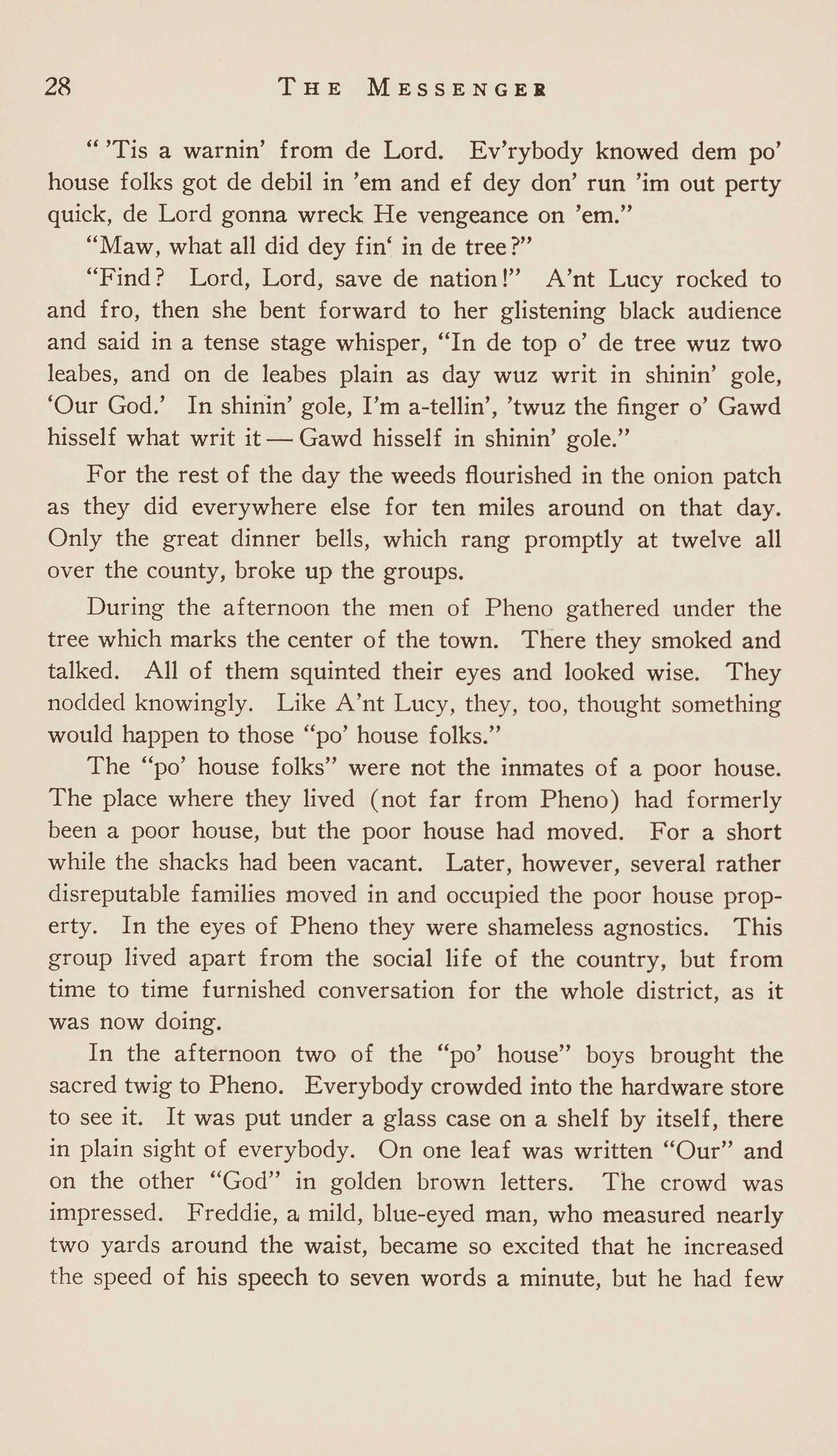
" 'Tis a warnin' from de Lord. Ev'rybody knowed dem po' house folks got de debil in 'em and ef dey don' run 'im out perty quick, de Lord gonna wreck He vengeance on 'em."
"Maw, what all did dey fin' in de tree?"
"Find? Lord, Lord, save de nation!" A'nt Lucy rocked to and fro, then she bent forward to her glistening black audience and said in a tense stage whisper, "In de top o' de tree wuz two leabes, and on de leabes plain as day wuz writ in shinin' gole, 'Our God.' In shiriin' gole, I'm a-tellin', 'twuz the finger o' Gawd hisself what writ it -Gawd hisself in shinin' gole."
For the rest of the day the weeds flourished in the onion patch as they did everywhere else for ten miles around on that day. Only the great dinner bells, which rang promptly at twelve all over the county, broke up the groups.
During the afternoon the men of Pheno gathered under the tree which marks the center of the town. There they smoked and talked. All of them squinted their eyes and looked wise. They nodded knowingly. Like A'nt Lucy, they, too, thought something would happen to those "po' house folks."
The "po' house folks" were not the inmates of a poor house. The place where they lived (not far from Pheno) had formerly been a poor house, but the poor house had moved. For a short while the shacks had been vacant. Later, however, several rather disreputable families moved in and occupied the poor house property. In the eyes of Pheno they were shameless agnostics. This group lived apart from the social life of the country, but from time to time furnished conversation for the whole district, as it was now doing.
In the afternoon two of the "po' house" boys brought the sacred twig to Pheno. Everybody crowded into the hardware store to see it. It was put under a glass case on a shelf by itself, there in plain sight of everybody. On one leaf was written "Our" and on the other "God" in golden brown letters. The crowd was impressed. Freddie, a mild, blue-eyed man, who measured nearly two yards around the waist, became so excited that he increased the speed of his speech to seven words a minute, but he had few

listeners; there was too much going on. Benny and Hiram, the ·two hardest drinkers in the place, swore off liquor for life. A great circle was made around the counter. Some one stepped on a dog, which yelled , startling everybody. Then the two red-nosed men went forward to the counter, raised their right hands and swore to the leaves they would never drink intoxicating drink again. Then each pulled a quart bottle from his pocket. The crowd stood back to let them pass, then followed them out. They broke the bottles and cast the evil from them.
On the evening train there came a drummer from Roanoke. He was taken to the hardware store by Marse Billie and shown the miracle. The gravity of the people was almost a shock to him. He had no use for his new line jokes, but, then, he could use them another time . He was greatly impressed with the story. After pis return to Roanoke, it came out in the papers. Roanoke sent for the leaves, which had now become quite withered. However, the words stood out even more plainly. Papers in larger cities got wind of the miracle and the news was widespread.
At Pheno wonderful things were happening. Jacob Adams, "the cussinest dern cusser" in the county, swore off cussin'. Mrs. Bingham and Mrs. Sharper met at the hardware store and vowed they'd stop "blessing' each other out." Chickens were safe .
More conversions followed. On the following Sunday everybody went to "preachin," both white and colored. The preachers drew great lessons from the leaves, while the babies cried and children squirmed.
About two in the afternoon Cora came slowly down the road from church. The ten little chocolate drops rushed out to meet her, heedless of the hot sun. A'nt Lucy sat still on the low porch in the shade, embracing herself. Cora came up to her, wet, hot and covered with dust. She had walked two miles.
"Lawsy, maw, ain't you done got ober de miseries yet?" Cora stood before A'nt Lucy fanning vigorously with a dirty sunbonnet. The great black hunk of misery on the porch nodded negatively.
"Mig Jones sez you ought a go ober and see dem leabes. She sez <lat Harrison Brown done got cured a his rumatizm jes by lookin' at dem leabes."

A'nt Lucy still said nothing, but rocked to and fro clasping herself tightly, moaning a little.
"You oughta been to church, maw. Dar war mos' as many fo'ks as what comes to de Gran' Settin'. I am neber seed so many fo'ks. All de sinnahs wuz dar and repentin' hawd. Miss Pauline had on a new yallah dress what her mistress ober to White Pines had made her. It had a gret big black budderfly right in de front. Dat nigger allus did act smart."
A'nt Lucy began to perk up a little and forget her miseries.
"Teddy Roosfelt Coleman died yestiddy and Lily Meeks 'lows as to how Miz Coleman's gonna as' them to let her put dem leabes on de coffin while de fun'rel am a-goin' on."
"Now, ain' it so." A'nt Lucy always said that when she agreed with anyone.
"Maw, if you goin' to see dem leabes we better go quick."
A'nt Lucy suddenly woke up.
"Charles Henry, run up to Marse Craddock and as' him kin we hab de white mule and de wagin dis a'ternoon. We wants to see de holy lea bes. Ef en we kin, hitch 'im up and fetch 'im down. O---o---o---my miseries. Run, niggah ! Can't you hear me a-talkin' to you?"
"Yep um." Charles Henry turned and darted up the hot dusty road to Marse Craddock's. However, Marse Craddock was out visiting, and the mule could not be procured. Later they engaged it for Wednesday afternoon.
Wednesday saw the Pheno of old. The usual games were going on, attended by the usual players and spectators. Hiram and Benny were drunk. Jacob Adams was out in the field vigorously swearing at his lop-eared mule.
In the afternoon An't Lucy came down the road clucking violently to an obstinate mule. Her spacious figure hid the family in the wagon behind her, but they were all there. Cora held the smallest; Charles Henry kept George Washington from falling out, and Rosa May held Arabella Louise. The rest were packed in so they couldn't fall out unless the whole crowd fell. The wagon

stof'J)ed before the hardware store, and the whole crowd scrambled down. A'nt Lucy led the way into the store.
"Whar dem holy leabes ?" she demanded.
The clerk grinned.
·Here they are," he said, showing her one of the twigs they had recently fixed up.
"Didn't you know the poor house boys burned those words on the leaves with cigarettes?"
A'nt Lucy grew fatly indignant .
"No sech uva thing," she stood with her fat, pudgy, black hands on her monstrous hips, looking belligerently at the young clerk.
"Jes case you have went to de city school, Mistah Jimmy Greene, you don' know as much as you think for. I know dem po' house critters, and I know dey ain' got de sense in dey haids to write in a good handwritin' like <lat. Dey ain' neber went to school. Dey is powerful ignorance. An' ef dey could write, dey too mean to write 'Gawd.' Dey would a writ 'debil.' You can' fool me 'case I know dem low down po' house folks. De debit gwine to get um yit and he gwine git you, too, ef you keep on a-sayin' dis here ain' holy words.''
A'nt Lucy led the tribe back to the wagon, mumbling to herself.
"Jimmy Greene ain' got no sense He ain' neber had no sense. He make me scratch whar I don' itch.''
She packed the family in the wagon until only a mass of wooly heads could be seen. Then she laboriously hoisted herself on to the front seat and clucked to the old white mule. She turned him around and started for home.
"I tells you chillun you better be good. Dem leabes is a sure sign £'om Gawd Hisself <lat Jedgment Day am a-comin' powerful soon. De Angel Gabriel am about to blow he trumpet."
And each little wooly head rolled its large pair of eyes and waited for the tooting of the golden horn.

<ltontcmporarp===.fflr. ~bans
To attempt a critical comment on a fellow student and his work and to publish it is at the very least unusual. But in spite of the lack of precedent and perhaps of encouragement, the writer herein essays to judge in some kind of way his contemporary, Mr. Judson Evans, and to present to students interested the effort usually expended on those whom we know we are safe in criticising.
There are several reasons why Mr. Evans deserves inspection, of which the foremost is that his work in THE MESSENGERhas been read consistently by students other than the editor and Mr. Evans himself. Even exchange editors in distant colleges have taken opportunity to comment upon his work and to approve or disapprove very decidedly. Second, Mr. Evans is worthy of our consideration because he writes a great deal and thinks more; and third, he is expected to fill a much needed place in our magazine next year.
In looking back over Mr. Evans' work of last year, we find his Gwendolyns, the first contribution. Here I see the first touch of that delightful sarcasm and ironical wit which characterize all his writing. In this sketch -for we cannot in all fairness call it a story-we have the fundamental traits which Mr. Evans was to elaborate in his forthcoming contributions to THE MESSENGER.
Primarily Mr. Evans is a champion of the "younger generation" -and probably not entirely because he is a member of it. He has participated rather widely, if not deeply, in experience with the genus Flapper, and he has learned to speak of silk hose and "the greater things of life" with equal grace -an attribute which is obviously to his credit. We are doubtless correct in assuming that his feminine readers regard him as a rather knowing young man, with just enough conceit to make him interesting and at times puzzling. We agree that Mr. Evans is conceitedto that invaluable extent in which he is not ignorant of his "oats"
-be they wild or tame ! In the cons1d~rc~~ ~!lJi~ ng girl of today is as much a sociologica~,ti :_~~ Associated Charities, my contemporary has verJ"'~J chofi/ ~e, Jfiore fascinating and eternal of the two and na~~ A ery-€'~ forgotten whatever sociological significance she have ha~ Q i with the result that he has manifestly found this much maligned young girl no less interesting than those with whom our fathers used to dance the Beautiful Blue Danube, and who afterwards became our mothers. There is one contribution Mr. Evans has made to our articulate campus : a very clever and ingenious defense and vindication of the modern girl; for Mr. Evans apparently believe s her to be no less than etern al feminine than tho se women for whom men once fought wars, lost thrones, wrote epics, and became good husbands - "as husbands go." While perhaps no weakling, in the sense in which men who are always in love are weak, Mr. Evans has undoubtedly tasted the bitter sweets of the tender emotion and enjoyed that good miserable feeling; but he has withal remained true to his still more youthful ideals of women -and has added to them just enough of laughing, paradoxical cynicism to be discerned in a shake of the head, and in a mildly skeptical exterior mind so as to be removed from the possibility of ever being seriously gulled. We wonder to what extent Mr. Evans treasures a large quantity of letters worn with repeated opening and folding; or if he keeps put away in a hidden drawer a tiny favor from some dance recalled with tender memories;or ever feels sentimental when "that" waltz is played! Alas, could we but know the secrets of the people who write so engagingly about others ! But we can but speculate, and besides, such consideration of this sex who do not already, tearfully perhaps, know it, allow me to inform you that Mr. Evans possesses quite apart from his own choice or control, a pair of the most inexcusable and tantalizing blue eyes that ever proved the inherent fickleness of their owner.
While obviously a critic of methods and manners of the younger generation, in the Fitzgerald plus Cabell fashion, Mr. Evans has very definitely shown us his opinions elsewhere. No one has
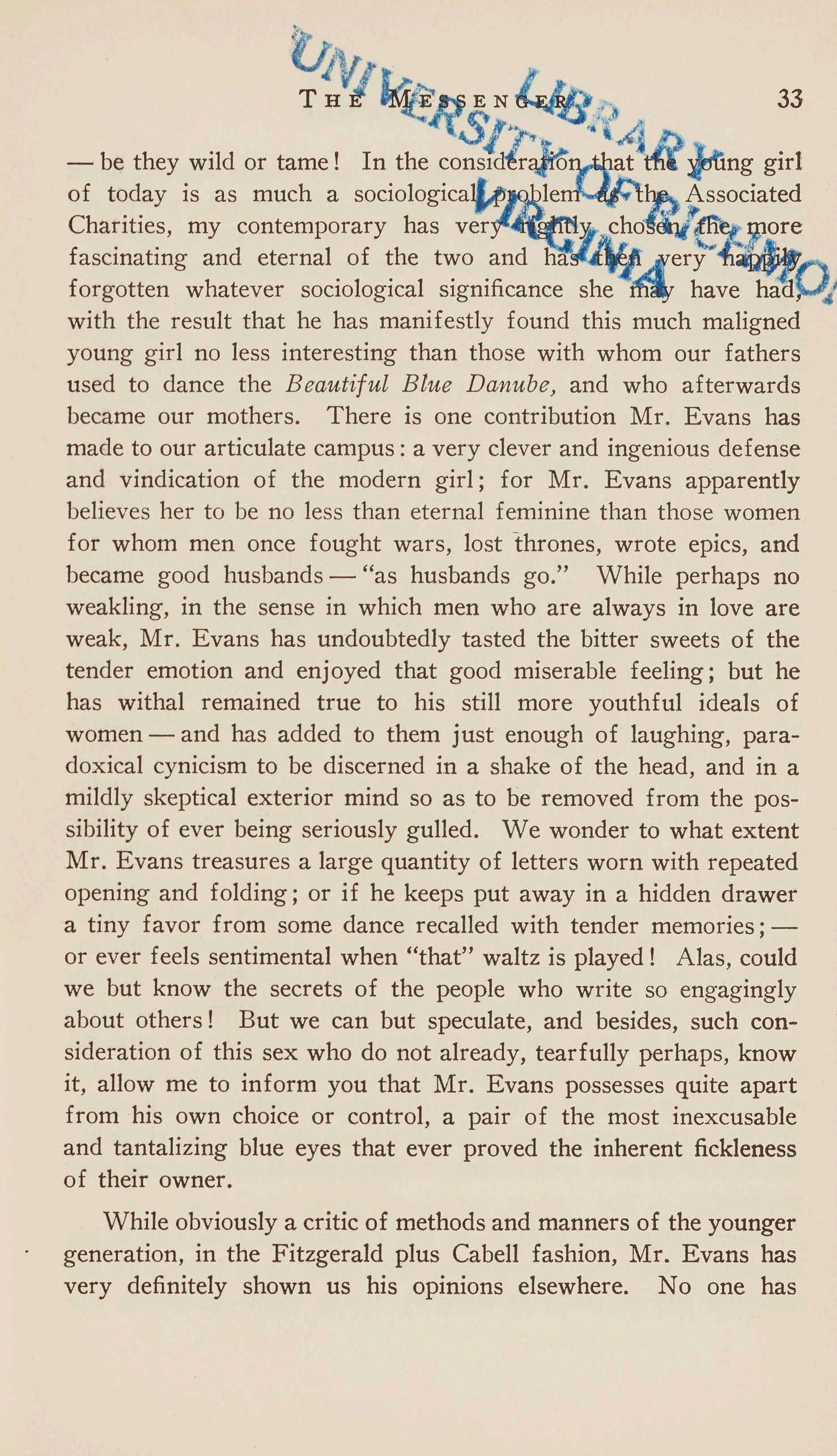
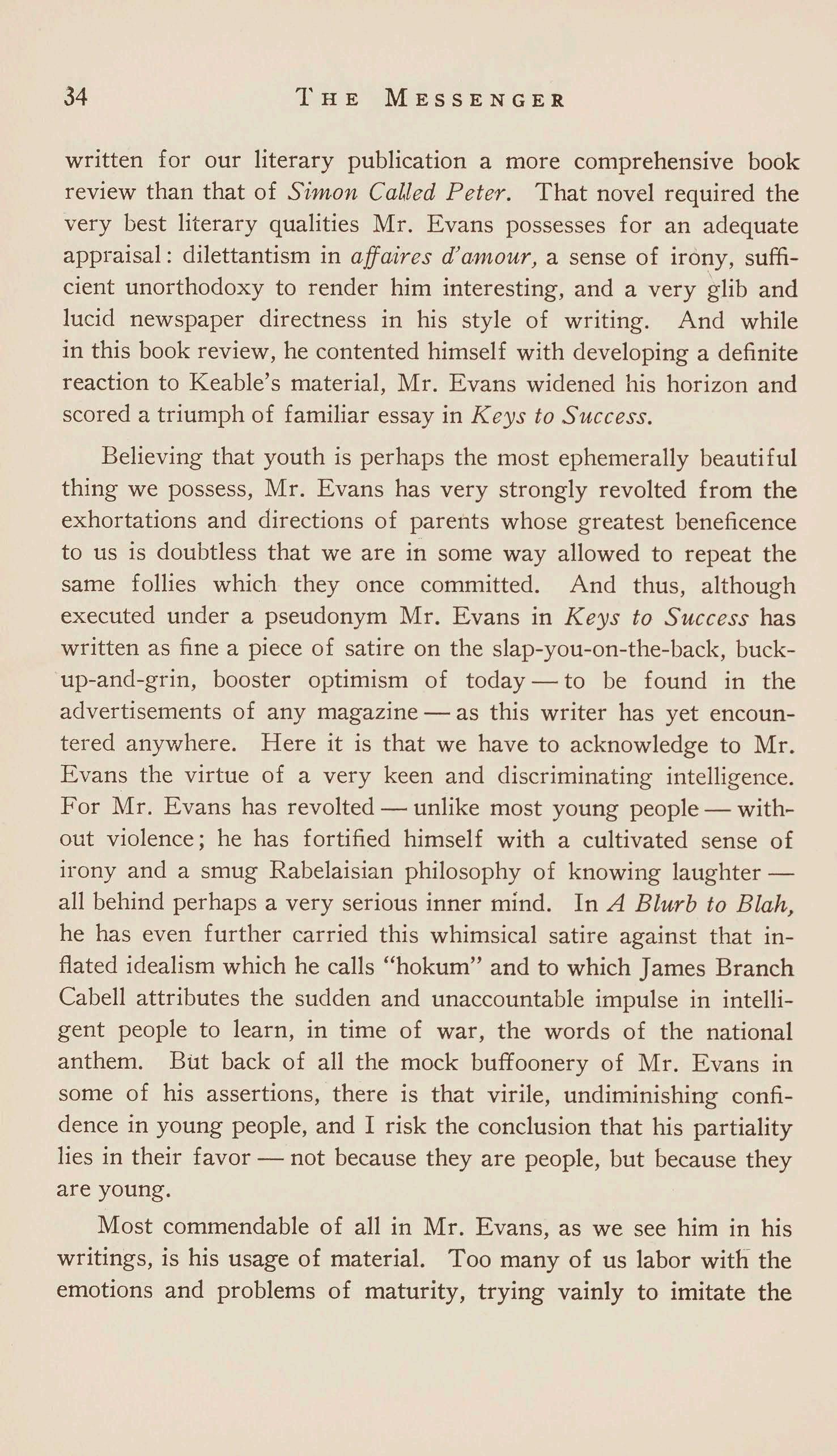
written for our literary publication a more comprehensive book review than that of Simon Cal.led Pet er. That novel required the very best literary qualities Mr. Evans possesses for an adequate appraisal: dilettantism in affaires d ' aniour, a sense of irony, sufficient unorthodoxy to render him interesting, and a very glib and lucid newspaper directness in his style of writing. And while in this book review, he contented himself with developing a definite reaction to Keable's material, Mr. Evans widened his horizon and scored a triumph of familiar essay in K eys to Success.
Believing that youth is perhaps the most ephemerally beautiful thing we possess, Mr. Evans has very strongly revolted from the exhortations and directions of parents whose greatest beneficence to us is doubtless that we are in some way allowed to repeat the same follies which they once committed. And thus, although executed under a pseudonym Mr. Evans in Keys to Success has written as fine a piece of satire on the slap-you-on-the-back, buckup-and-grin, booster optimism of today-to be found in the advertisements of any magazine - as this writer has yet encountered anywhere. Here it is that we have to acknowledge to Mr. Evans the virtue of a very keen and discriminating intelligence. For Mr Evans has revolted - unlike most young people -without violence; he has fortified himself with a cultivated sense of irony and a smug Rabelaisian philosophy of knowing laughterall behind perhaps a very serious inner mind. In A Blurb to Blah, he has even further carried this whimsical satire against that inflated idealism which he calls "hokum" and to which James Branch Cabell attributes the sudden and unaccountable impulse in intelligent people to learn, in time of war, the words of the national anthem. But back of all the mock buffoonery of Mr. Evans in some of his assertions, there is that virile, undiminishing confidence in young people, and I risk the conclusion that his partiality lies in their favor -not because they are people, but because they are young.
Most commendable of all in Mr. Evans, as we see him in his writings, is his usage of material. Too many of us labor with the emotions and problems of maturity, trying vainly to imitate the

classics and failing-as it is to be expected. My contemporary has very happily eschewed the tragedy, the weird, the oppressive, and has written of that world which no one can say he does not know To his unquestionable knowledge of things as they really exist in his world he has added a touch of the ideal-the unifying - and we have the result: delightfully amusing and interesting sketches of life among the younger generation. Even into Shakespeare has Mr. Evans been able to carry his fine feeling and response to youth-and in Shakespeare's Women he has given us a typically young man's picture of Portia, Juliet, Imogen, Rosilind, and others, - a picture which we seldom see in print. In my opinion, Shakesp eare's Women by Mr. Evans, is the strongest essay of its sort appearing in THE MESSENGERfor many years. If, from Mr. Evans' point of view alone, it is commendable, - it is in the assertion that this essay proves beyond doubt the versatility of its author for forms of writing, although he is more comfortably at home in the field of the younger generation than in treatises which would do credit to musty scholarship.
We cannot leave a discussion of any writer without remarking on the mechanics of his writing. Critics are wont to discourse endlessly on style. Thus, after reading Mr. Evans' contributions to THE MESSENGER,we are thoroughly convinced that he is distinctly individual in style. Primarily, Mr. Evans leans toward the bright, the smart, and the witty diction of the younger critics. His sentences carry the poignancy of refined slang without offense - and this, for the good reason that Mr. Evans unconsciously places that doubtful medium of expression beside the best of English, thus giving to the latter a spicy stinging flavor not in the least unbecoming to the subject which he treats. To those who oppose the usage of slang, I say that they are justified because they themselves ( when they do attempt to write) are unable to use it with the delicacy and proportion exemplified by Mr. Evans.
For the benefit of the unlearned, we take this occasion to say that Mr. Evans does not write "short stories," as such. What he really has does has been to catch certain, very definite impressions of life among those his age and to develop from them charming
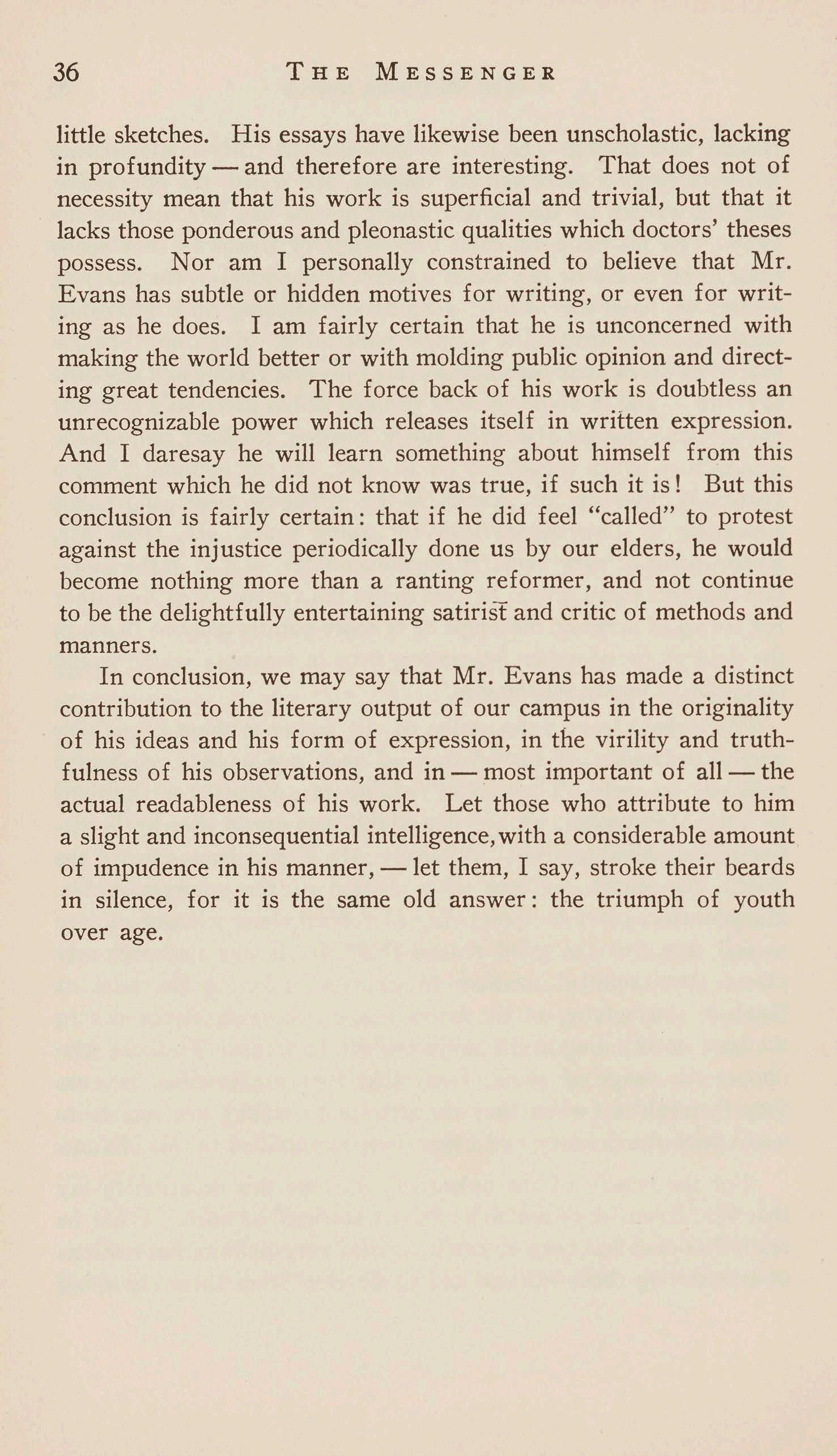
little sketches. His essays have likewise been unscholastic, lacking in profundity -and therefore are interesting. That does not of necessity mean that his work is superficial and trivial, but that it lacks those ponderous and pleonastic qualities which doctors' theses possess. Nor am I personally constrained to believe that Mr. Evans has subtle or hidden motives for writing, or even for writing as he does. I am fairly certain that he is unconcerned with making the world better or with molding public opinion and directing great tendencies. The force back of his work is doubtless an unrecognizable power which releases itself in written expression. And I daresay he will learn something about himself from this comment which he did not know was true, if such it is! But this conclusion is fairly certain: that if he did feel "called" to protest against the injustice periodically done us by our elders, he would become nothing more than a ranting reformer, and not continue to be the delightfully entertaining satirist and critic of methods and manners.
In conclusion, we may say that Mr. Evans has made a distinct contribution to the literary output of our campus in the originality of his ideas and his form of expression, in the virility and truthfulness of his observations, and in -most important of all -the actual readableness of his work. Let those who attribute to him a slight and inconsequential intelligence, with a considerable amount of impudence in his manner, -let them, I say, stroke their beards in silence, for it is the same old answer: the triumph of youth over age.

~pril i~ tbt ~rutle~t;fflontb
GEORGE R. FREEDLEY
Limpid melody mirrors Ltf e as does a grass-rimmed pool reflect the placid sky.
Exquisite tones image Beauty as does a burbling brook reflect the lonely passer-by.
Lilting music so lusciously mellifulous that its mnate harmony seemingly answers the cry of restless Nature and i am satisfied for a while but for only a little while only a little while a little whiJe.
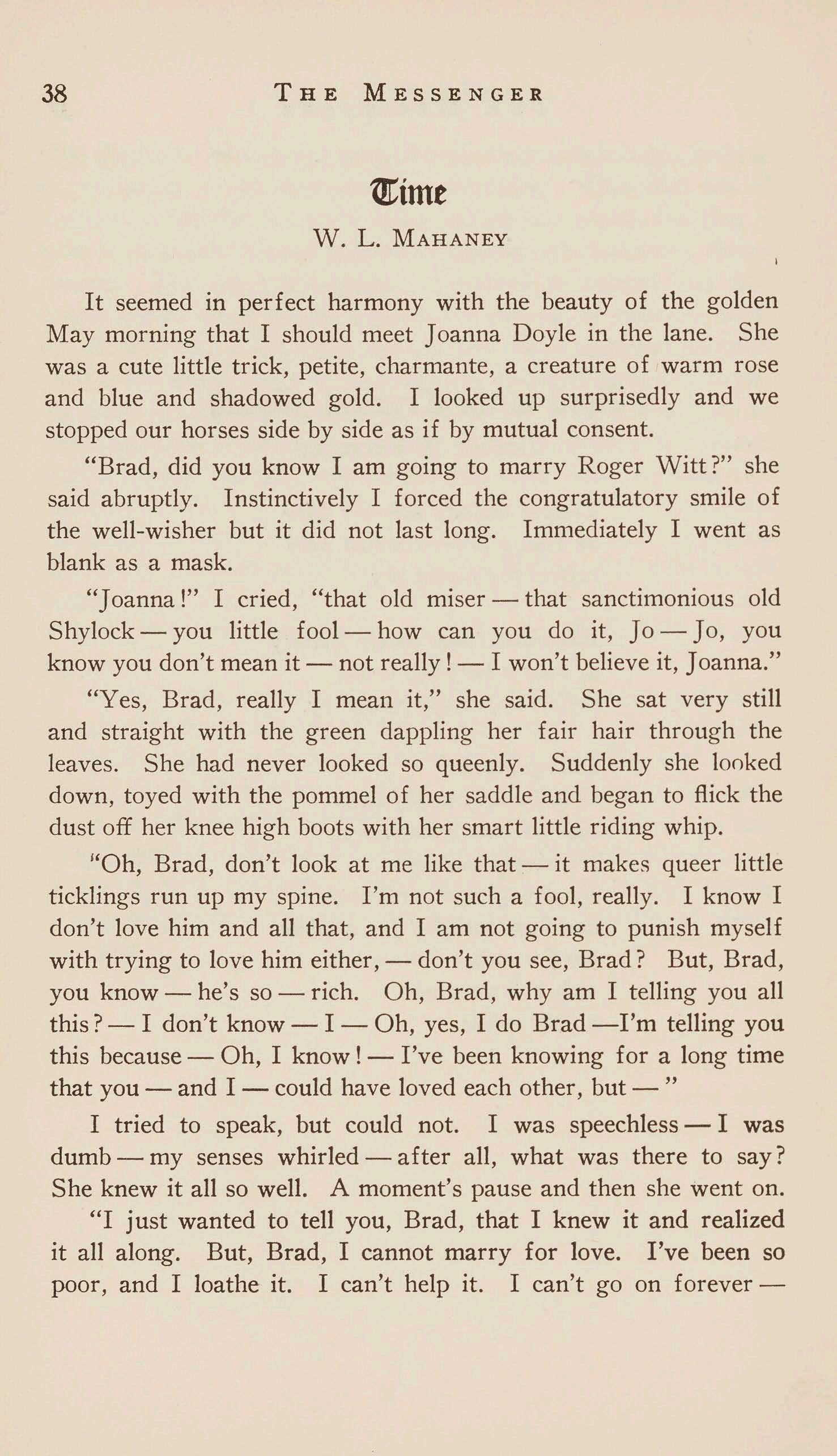
W. L. MAHANEY
It seemed in perfect harmony with the beauty of the golden May morning that I should meet Joanna Doyle in the lane. She was a cute little trick, petite, charmante, a creature of warm rose and blue and shadowed gold. I looked up surprisedly and we stopped our horses side by side as if by mutual consent.
"Brad, did you know I am going to marry Roger Witt?" she said abruptly. Instinctively I forced the congratulatory smile of the well-wisher but it did not last long. Immediately I went as blank as a mask.
"Joanna !" I cried, "that old miser -that sanctimonious old Shylock -you little fool -how can you do it, Jo -Jo, you know you don't mean it -not really! -I won't believe it, Joanna."
"Yes, Brad, really I mean it," she said. She sat very still and straight with the green dappling her fair hair through the leaves. She had never looked so queenly. Suddenly she looked down, toyed with the pommel of her saddle and began to flick the dust off her knee high boots with her smart little riding whip.
"Oh, Brad, don't look at me like that -it makes queer little ticklings run up my spine. I'm not such a fool, really. I know I don't love him and all that, and I am not going to punish myself with trying to love him either, -don't you see, Brad? But, Brad, you know-he's so - rich. Oh, Brad, why am I telling you all this?-I don't know-I-Oh, yes, I do Brad-I'm telling you this because - Oh, I know! - I've been knowing for a long time that you -and I -could have loved each other, but-"
I tried to speak, but could not. I was speechless -I was dumb -my senses whirled - after all, what was there to say? She knew it all so well. A moment's pause and then she went on.
"I just wanted to tell you, Brad, that I knew it and realized it all along. But, Brad, I cannot marry for love. I've been so poor, and I loathe it. I can't help it. I can't go on forever -

being so poor -even for love. And so I'm saving love - till last. Now-I'm going to marry Roger-he's seventy-two -and, oh, so rich - he'll die -can't you see?"
"But, Joanna, is it worth it? You'll have to live with himlook after him - nurse him -take care of him - and - " I was numb with the horror of what she was doing.
"Ye s , but Brad - at the end -clothes -jewels - cars -servants - beautiful things! And, Oh Brad , I'm made for beautiful things. I know it. I want them so -wealth - ease -I've dreamed of it all my life -" The sharp glitter of her eyes - the breathless ecstasy of her voice cut me like a knife.
So Joanna , whom I had loved as only a boy can love a girl when they are in their teens, married the decrepit old miser and went to live with him in the shabbiest, dreariest and most dilapidated old house in town. The first two or three years the most insistent r epairs were made; after that there were never any more. After five years Joanna seemed to retire from the world, into, the creaky wreck which was her home. In time I married one of the village girls and settled down to the calm peace of a happy married life. In the deep contentment of such a life, I seldom gave thought to Joanna. She seemed to have dropped completely out of life. Occasi onally we met them on the way to church. Joanna always drove and sat silently by the gaunt, bent, old skeleton who was her husband. She usually gave me a blank sort of a smile; later, however, even that became occasional. She seemed to forget me and her look was dull and unrecognizing.
The longevity of old Roger Witt soon became the marvel of the community. He seemed to cling to life with the same tenacity with which he had always clung to whatever else he possessed. Newspapers began to send representatives to interview him,photographers came to get a "snap" of him. Finally at the age of ninety-two, twenty years after Joanna Doyle had married him, he passed away.
His death caused little or no flurry in the community in which he had lived so long. There was an unelaborate funeral which

everyone attended as a matter of course, and a bit of comment as to "how much" he left his widow. Thus passed Roger Witt. About a week after demise, some strange impulse led me to call on Joanna, for the first time in all these years. She greeted me with an absent-minded "Yes -Oh, yes - Brad Palmer. I know now," when I told her my name and kept on with her knitting. "You're going to stay on in this house?" I asked her. "Why , yes, surely"; she clicked on with her needles. "Too much trouble to move. And there's no real reason why I should go, is there? By the way, would you mind turning out one of those bulbs there -no -the one behind you. Just unscrew it a little. Electricity is so expensive."
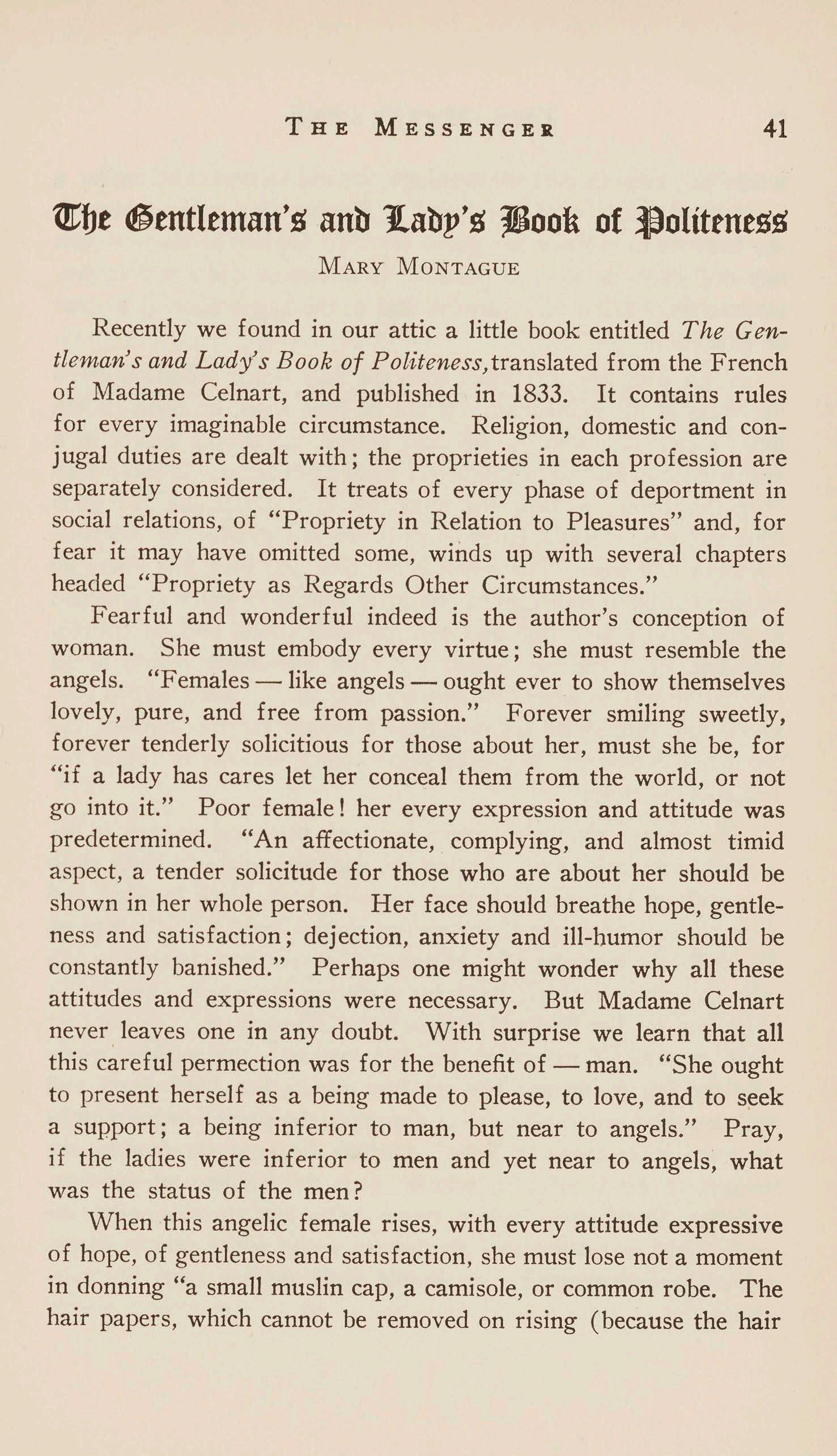
MARY MONTAGUE
Recently we found in our attic a little book entitled The Gentleman's and Lady's Book of Politeness, translated from the French of Madame Celnart, and published in 1833. It contains rules for every imaginable circumstance. Religion, domestic and conjugal duties are dealt with; the proprieties in each profession are separately considered. It treats of every phase of deportment in social relations, of "Propriety in Relation to Pleasures" and, for fear it may have omitted some, winds up with several chapters headed "Propriety as Regards Other Circumstances."
Fearful and wonderful indeed is the author's conception of woman. She must embody every virtue; she must resemble the angels. "Females - like angels - ought ever to show themselves lovely, pure, and free from passion." Forever smiling sweetly, forever tenderly solicitious for those about her, must she be, for "if a lady has cares let her conceal them from the world, or not go into it." Poor female! her every expression and attitude was predetermined. "An affectionate, complying, and almost timid aspect, a tender solicitude for those who are about her should be shown in her whole person. Her face should breathe hope, gentleness and satisfaction; dejection, anxiety and ill-humor should be constantly banished." Perhaps one might wonder why all these attitudes and expressions were necessary. But Madame Celnart never leaves one in any doubt. With surprise we learn that all this careful permection was for the benefit of - man. "She ought to present herself as a being made to please, to love, and to seek a support; a being inferior to man, but near to angels." Pray, if the ladies were inferior to men and yet near to angels, what was the status of the men?
When this angelic female rises, with every attitude expressive of hope, of gentleness and satisfaction, she must lose not a moment in donning "a small muslin cap, a camisole, or common robe. The hair papers, which cannot be removed on rising (because the hair
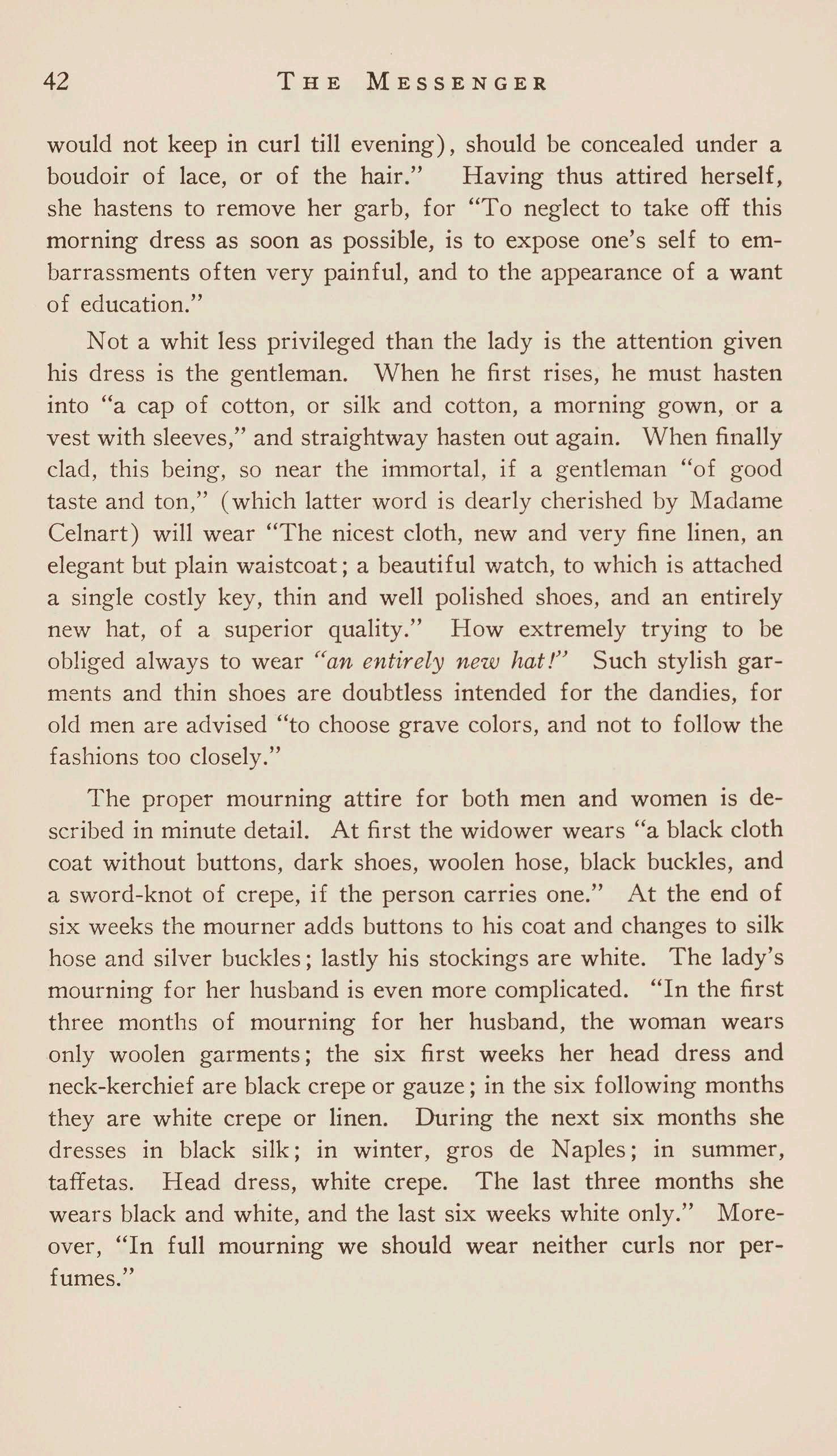
would not keep in curl till evening), should be concealed under a boudoir of lace, or of the hair." Having thus attired herself, she hastens to remove her garb, for "To neglect to take off this morning dress as soon as possible, is to expose one's self to embarrassments of ten very painful, and to the appearance of a want of education."
Not a whit less privileged than the lady is the attention given his dress is the gentleman. When he first rises, he must hasten into "a cap of cotton, or silk and cotton, a morning gown, or a vest with sleeves," and straightway hasten out again. When finally clad, this being, so near the immortal, if a gentleman "of good taste and ton," ( which latter word is dearly cherished by Madame Celnart) will wear "The nicest cloth, new and very fine linen, an elegant but plain waistcoat; a beautiful watch, to which is attached a single costly key, thin and well polished shoes, and an entirely new hat, of a superior quality." How extremely trying to be obliged always to wear "an entirely new hat!" Such stylish garments and thin shoes are doubtless intended for the dandies, for old men are advised "to choose grave colors, and not to follow the fashions too closely."
The proper mourning attire for both men and women is described in minute detail. At first the widower wears "a black cloth coat without buttons, dark shoes, woolen hose, black buckles, and a sword-knot of crepe, if the person carries one." At the end of six weeks the mourner adds buttons to his coat and changes to silk hose and silver buckles; lastly his stockings are white. The lady's mourning for her husband is even more complicated. "In the first three months of mourning for her husband, the woman wears only woolen garments; the six first weeks her head dress and neck-kerchief are black crepe or gauze; in the six following months they are white crepe or linen. During the next six months she dresses in black silk; in winter, gros de Naples; in summer, taffetas. Head dress, white crepe. The last three months she wears black and white, and the last six weeks white only." Moreover, "In full mourning we should wear neither curls nor perfumes."

One would find difficulty in imagining a condition for which Madame Celnart has failed to provide. Literally every step that one takes has been anticipated and provided for. "You must pay attention to your manner of walking; for fear of throwing mud around you, and spattering yourself as well as those who accompany you, or who walk behind you." She explains the method by means of which the Parisian ladies have become famed for their skill in walking. "We must be careful to put the foot on the middle of the paving stones and never on the edge, for, in that case, only inevitably slips into the interstice between one pavement and another; we must begin by supporting the toe, before we do the heel; and even when the mud is quite deep, we must put down the heel but seldom." One could want no more charming picture than this of the lady, as she trips along, gracefully raising her dress a little above the ankle, with one hand, for "To raise the dress on both sides, and with both hands, is vulgar. This ungraceful practice can be tolerated only for a moment, when the mud is very deep." But how different a picture is the following, where, "in the street of a large city, in order to avoid jostling, one can edge along by turning sideways, contracting his arms, and watching with his eye the direction which it is best to take in order not to come in contact with the person who meets him. A little practice and care will soon make this duty familiar."
We are told to make our visit to the sick "very short, silent and reserved." Nevertheless we are charged to "address a thousand quotations concerning their complaints." Moreover it is suggested that "to a lame person you might say that you yourself are fatigued with walking, that your own legs are not firm, etc."
This century-old "Book of Etiquette" furnishes a detailed picture of life a hundred years ago. "If a carriage happen to stop in such a manner as to leave only a narrow passage between it and the houses, beware of elbowing and rudely crowding the passengers, with a view to getting by more expeditiously; wait your turn, and if any come up, you should edge up to the wall, in order to give them the place." "If stormy weather has made it necessary to lay a plank across the gutters, which have
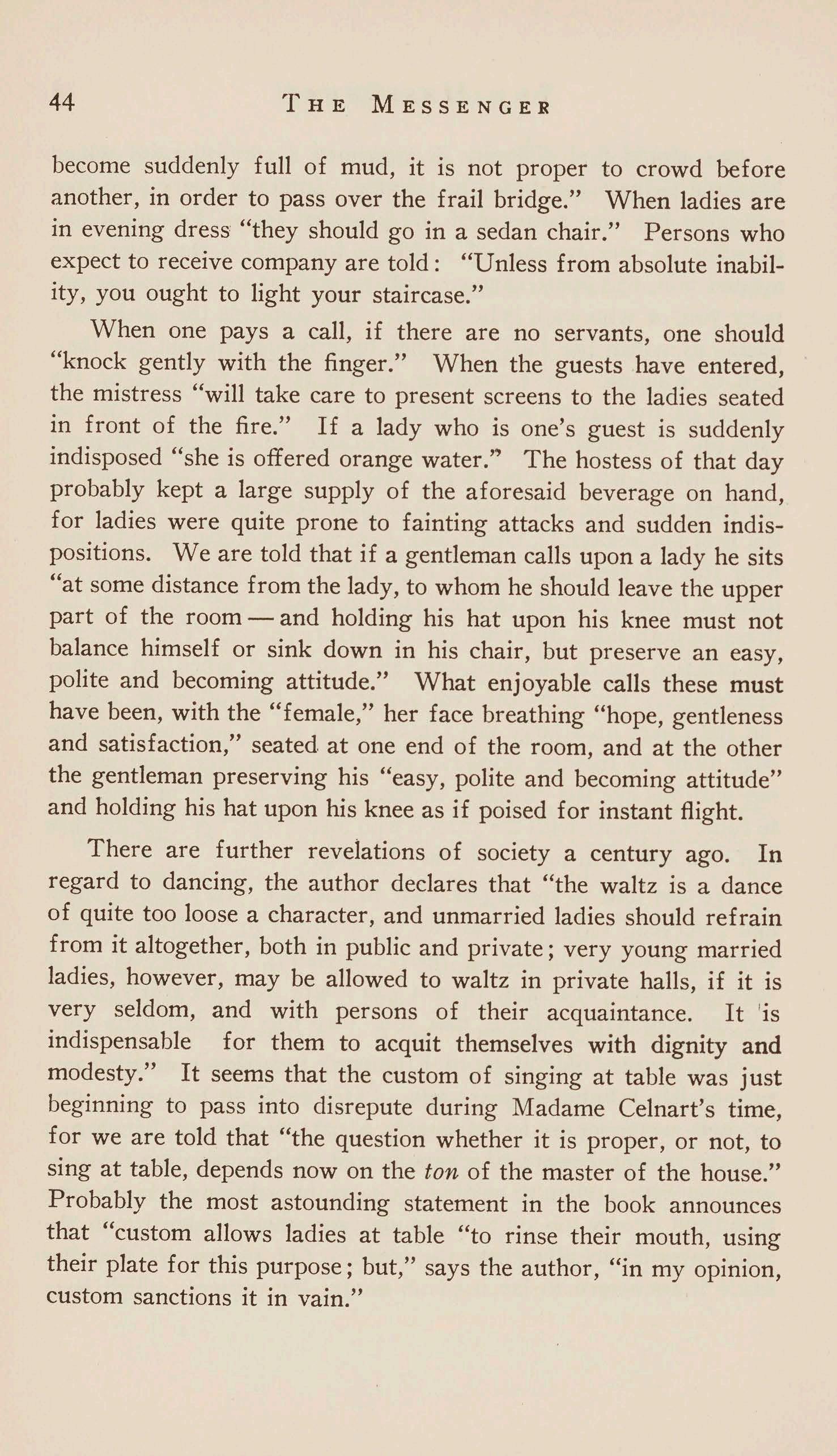
become suddenly full of mud, it is not proper to crowd before another, in order to pass over the frail bridge." When ladies are in evening dress "they should go in a sedan chair." Persons who expect to receive company are told: "Unless from absolute inability, you ought to light your staircase."
When one pays a call, if there are no servants, one should "knock gently with the finger." When the guests have entered, the mistress "will take care to present screens to the ladies seated in front of the fire." If a lady who is one's guest is suddenly indisposed "she is offered orange water." The hostess of that day probably kept a large supply of the aforesaid beverage on hand, for ladies were quite prone to fainting attacks and sudden indispositions. We are told that if a gentleman calls upon a lady he sits "at some distance from the lady, to whom he should leave the upper part of the room -and holding his hat upon his knee must not balance himself or sink down in his chair, but preserve an easy, polite and becoming attitude." What enjoyable calls these must have been, with the "female," her face breathing "hope, gentleness and satisfaction," seated at one end of the room, and at the other the gentleman preserving his "easy, polite and becoming attitude" and holding his hat upon his knee as if poised for instant flight.
There are further revelations of society a century ago. In regard to dancing, the author declares that "the waltz is a dance of quite too loose a character, and unmarried ladies should refrain from it altogether, both in public and private ; very young married ladies, however, may be allowed to waltz in private halls, if it is very seldom, and with persons of their acquaintance. It 'is indispensable for them to acquit themselves with dignity and modesty." It seems that the custom of singing at table was just beginning to pass into disrepute during Madame Celnart's time, for we are told that "the question whether it is proper, or not, to sing at table, depends now on the ton of the master of the house." Probably the most astounding statement in the book announces that "custom allows ladies at table "to rinse their mouth, using their plate for this purpose; but," says the author, "in my opinion, custom sanctions it in vain."
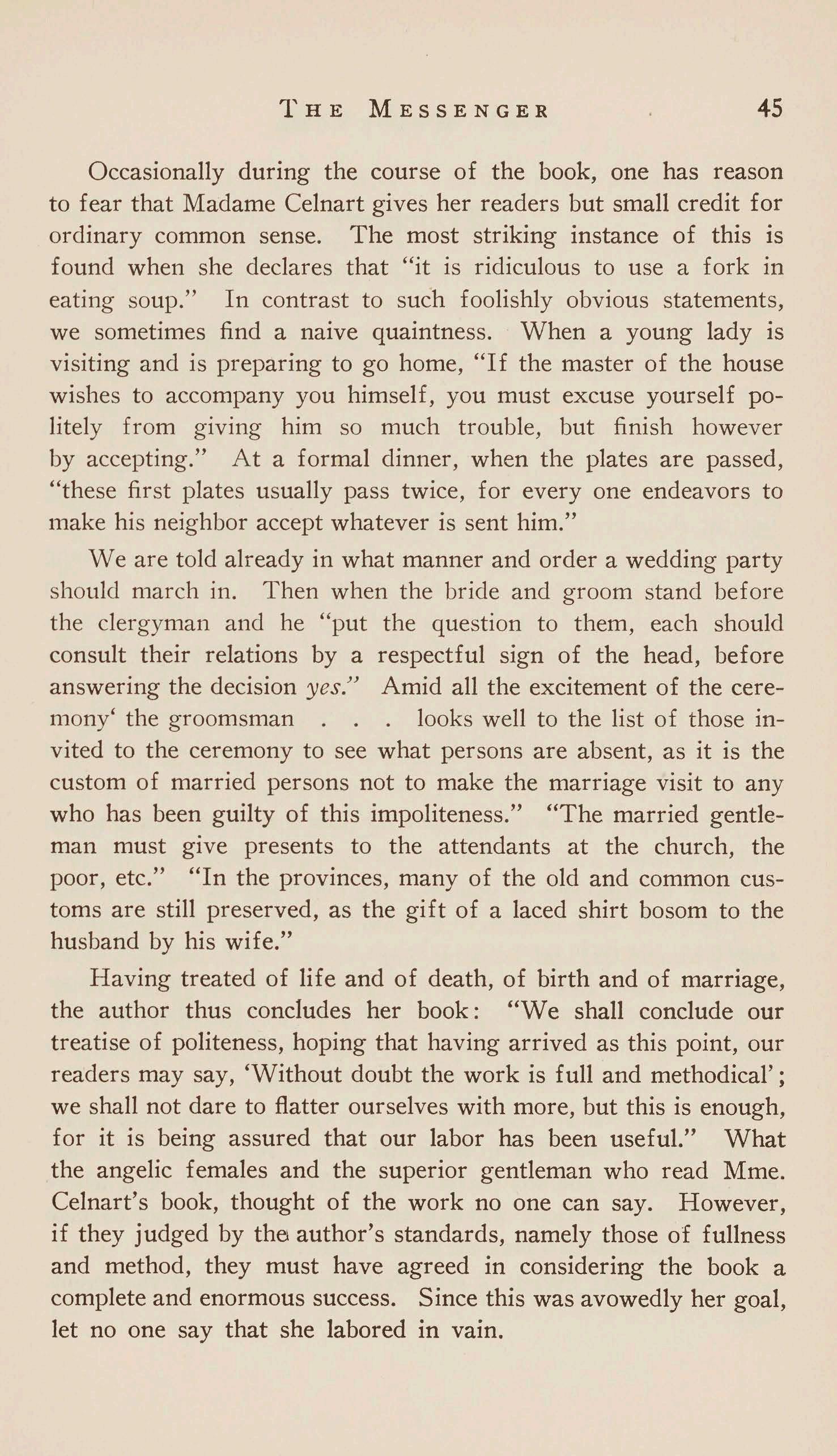
Occasionally during the course of the book, one has reason to fear that Madame Celnart gives her readers but small credit for ordinary common sense. The most striking instance of this is found when she declares that "it is ridiculous to use a fork in eating soup." In contrast to such foolishly obvious statements, we sometimes find a naive quaintness. When a young lady is visiting and is preparing to go home, "If the master of the house wishes to accompany you himself, you must excuse yourself politely from giving him so much trouble, but finish however by accepting." At a formal dinner, when the plates are passed, "these first plates usually pass twice, for every one endeavors to make his neighbor accept whatever is sent him."
We are told already in what manner and order a wedding party should march in. Then when the bride and groom stand before the clergyman and he "put the question to them, each should consult their relations by a respectful sign of the head, before answering the decision yes." Amid all the excitement of the ceremony' the groomsman looks well to the list of those invited to the ceremony to see what persons are absent, as it is the custom of married persons not to make the marriage visit to any who has been guilty of this impoliteness." "The married gentleman must give presents to the attendants at the church, the poor, etc." "In the provinces, many of the old and common customs are still preserved, as the gift of a laced shirt bosom to the husband by his wife."
Having treated of life and of death, of birth and of marriage, the author thus concludes her book: "We shall conclude our treatise of politeness, hoping that having arrived as this point, our readers may say, 'Without doubt the work is full and methodical'; we shall not dare to flatter ourselves with more, but this is enough, for it is being assured that our labor has been useful." What the angelic females and the superior gentleman who read Mme. Celnart's book, thought of the work no one can say. However, if they judged by the author's standards, namely those of fullness and method, they must have agreed in considering the book a complete and enormous success. Since this was avowedly her goal, let no one say that she labored in vain.

In the tiny bedroom at the back of Carl Hagen's bakery, a man stood by the window, playing a violin. It was January and the winter's moon was flooding the bare room with a cold, almost cruel light. The room was cold enough, as it was, even though there was a little fire in the air-tight stove. But Carl Hagen was oblivious of the cold room and the colder moonlight, of everything but the thoughts of all the broken hopes, the rebellion, the defeat which came from his violin in a flood of tumultuous, crashing sounds. A full crescendo on a minor chord, and he stopped abruptly. He must not! It was not like a Hagen to be defeated. He raised his violin to his shoulder and started to play again. This time the soft tremulous notes of Traumerei filled the tiny room. There was still a little of rebellion in the music, but the dreaminess of the song soothed him until he was able to sleep deeply for several hours.
He arose in the morning, put the few loaves of bread, which had been made from the last of the flour, in the oven. He shut the door with a slam of disgust. He hated baking bread, always had hated it. He picked up a part of a newspaper which Herr Hoffman, the little man who tried to write poetry, had left in the shop the night before. Carl was literally buried in the paper when his young nephew opened the door of the shop and entered. The boy stopped, his eyes wide with astonishment, for his beloved Uncle Carl was talking to himself.
"Herman Schiller coming! Oh, my God, and tomorrow night. What would I not give to hear him play? Ah, Fritz must hear him; he must. The boy played beautifully last night. But where is the money? Frieda will not lend it to me, especially to take the boy to hear a man play the fiddle. Bah!"
"Uncle Carl! What is it?" Frederick interrupted the monologue.

"Eh? Is that you, Fritz? Run, bring the violin to me. I have a story to tell you, boy."
Carl took the aged case from the boy's hands, tenderly drew out the violin and fondled it with nervous hands. His love for the instrument was pathetically beautiful. All the father-love which had been denied him found vent in his love for the violin and for Frederick, or Fritz as he fondly called him, who was fast learning to play it.
"Listen , Fritz ," and Carl began to play. The beauty, the pathos, the fervor, the hope, the struggle, and the ultimate chord of determined finality which the man put into his music almost frightened the boy. Yet he was enough attuned to the interpretation of music to feel, intuitively, the story which his uncle told him later.
"Herman Schiller and I were boys together, Fritz, just like you and Carl Litzen, and it wa s on this very violin that the gates of fame were opened to him. We used to play it, by turns, down by the river , and dream of the fame that each of us was to receive some time. It was one of those times when Herman was playing and both were dreaming that a wealthy gentleman heard him play and offered to educate him. There was another gentleman with him, Herr Richter , who wanted me to sell this," and Carl's hand touched the instrument, caressingly. "But, no, I did not want to sell it then. It was my father's legacy to me and had been his father's before him. Ever since then Herr Richter has wanted to buy it; has come here every year to offer me five hundred thousand marks for it. That is a great deal of money, Fritz. Possibly some time I will have it so that you can go to Berlin -not 'till you're older, though, boy. But Fritz, Herman is a great artist. He has worked hard for years and they say his playing is wonderful. I'm going to try some way to let you hear him . Yes. I must! But don't bother me now, boy; the bread is almost done ."
The story was told simply, for Carl could speak much better with his violin. After Fritz had gone, Carl methodically took the loaves from the oven. If he sold them all, there would not be enough money for one ticket. Fritz must hear Herman. It was the first time the great artist had been there for a concert, and it
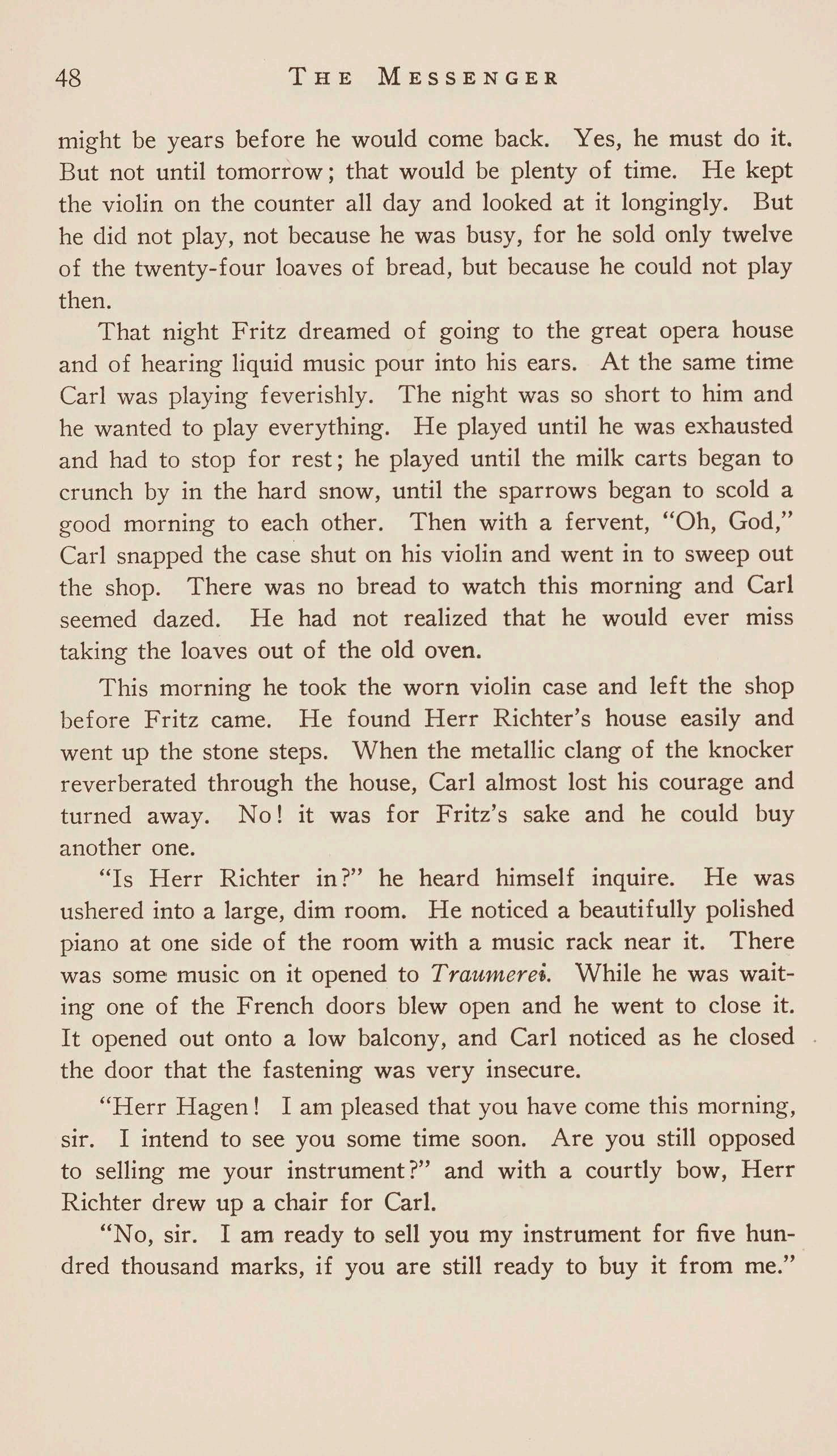
might be years before he would come back. Yes, he must do it. But not until tomorrow ; that would be plenty of time. He kept the violin on the counter all day and looked at it longingly. But he did not play, not because he was busy, for he sold only twelve of the twenty-four loaves of bread, but because he could not play then.
That night Fritz dreamed of going to the great opera house and of hearing liquid music pour into his ears. At the same time Carl was playing feverishly. The night was so short to him and he wanted to play everything. He played until he was exhausted and had to stop for rest; he played until the milk carts began to crunch by in the hard snow, until the sparrows began to scold a good morning to each other. Then with a fervent, "Oh, God," Carl snapped the case shut on his violin and went in to sweep out the shop. There was no bread to watch this morning and Carl seemed dazed. He had not realized that he would ever miss taking the loaves out of the old oven.
This morning he took the worn violin case and left the shop before Fritz came. He found Herr Richter's house easily and went up the stone steps. When the metallic clang of the knocker reverberated through the house, Carl almost lost his courage and turned away. No! it was for Fritz's sake and he could buy another one.
"Is Herr Richter in?" he heard himself inquire. He was ushered into a large, dim room. He noticed a beautifully polished piano at one side of the room with a music rack near it. There was some music on it opened to Traumerei. While he was waiting one of the French doors blew open and he went to close it. It opened out onto a low balcony, and Carl noticed as he closed the door that the fastening was very insecure.
"Herr Hagen! I am pleased that you have come this morning, sir. I intend to see you some time soon. Are you still opposed to selling me your instrument?" and with a courtly bow, Herr Richter drew up a chair for Carl.
"No, sir. I am ready to sell you my instrument for five hundred thousand marks, if you are still ready to buy it from me."

Carl could scarcely realize that he was at last offering to sell his violin. He cringed inwardly at the cold sound of his words, for it was like selling his soul. He made up his mind two years ago when Fritz had begun to show a marked interest in playing, that he would sell his violin and use the money to educate the boy. But now when the time came, it took all his strength to make the transaction. After leaving Herr Richter's house, Carl stopped by a bank and deposited his money in Fritz's name, but with himself as trustee.
That night he and Fritz reached the theatre about an hour before the concert was to begin. He wanted Fritz to see everything. Even then there was a long line in front of the ticket office, and as he came up to it there were murmurs of protest and disappointed faces. The line had broken in places and Carl pushed his way through to the window.
"Two tickets in the balcony, please."
"I tell you, there aren't any tickets in the house."
"Aren't-any-tickets? Aren't any tickets?"
"No, old man, there aren't -any-tickets."
"My God!" It was a strange cry. Carl had at last grasped what the man meant. He was weak and in a cold perspiration. The violin was gone and all the money that stood for it could not buy a seat for the concert.
"Uncle Carl! I'm cold. Let's go inside."
"Ah! boy! We can't hear Herman Schiller tonight. There is no room for us. I'm sorry, son, but maybe the next time he comes you can hear him."
Carl was silent all the way home. When he left Fritz at the door he put his arms around the child and held him tightly. There was a hoarse sob in his throat as he turned quickly away. He walked with huge strides up one street and down another. He didn't know; didn't care where he was going. Why had every thing been such a failure? Suddenly he surprised and shocked himself to find that he was standing by the low balcony of Herr Richter's house. Why was he there? Ah, yes, he knew. The violin was just inside that wall and he wanted to play it. Wanted
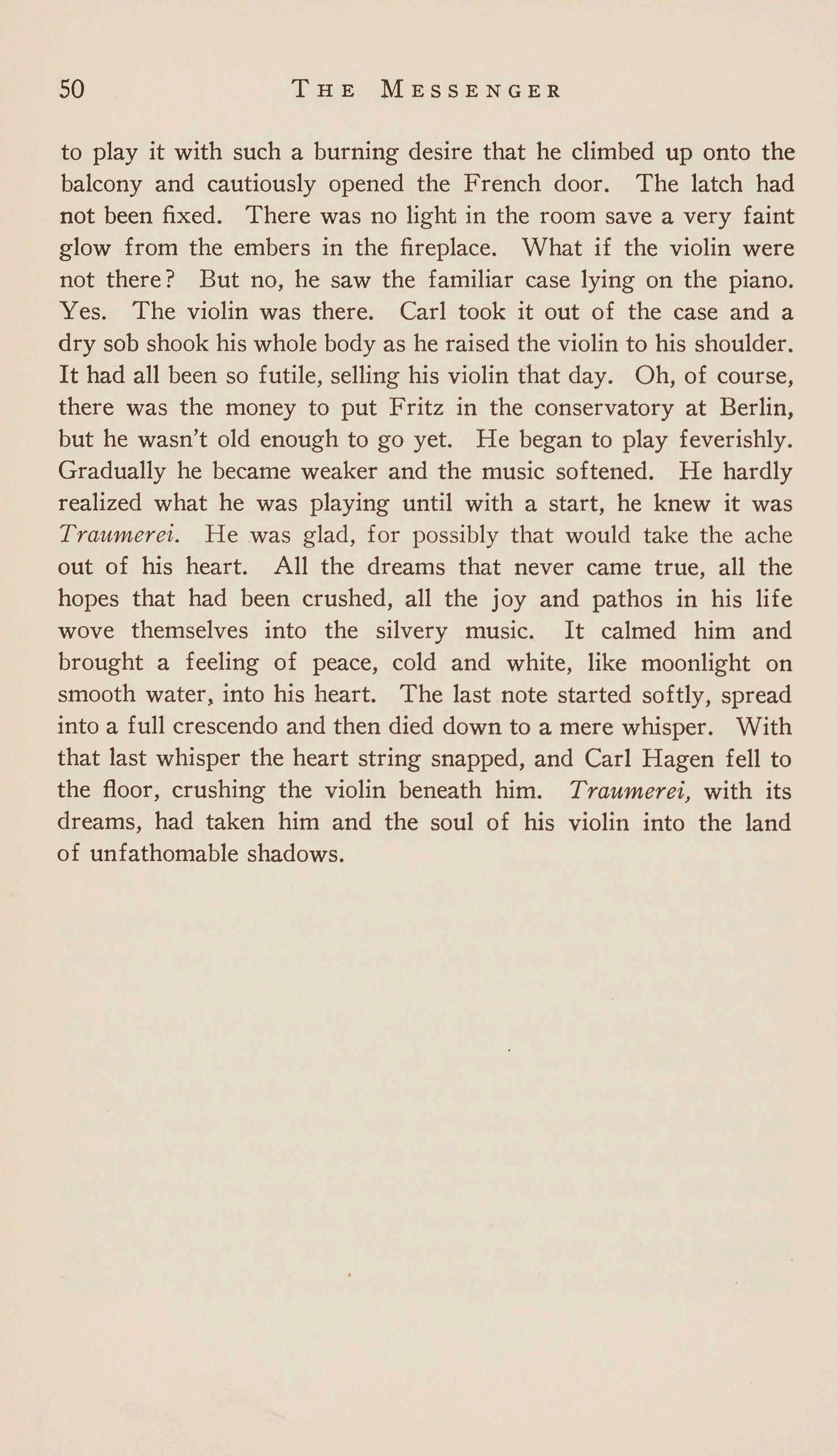
to play it with such a burning desire that he climbed up onto the balcony and cautiously opened the French door. The latch had not been fixed. There was no light in the room save a very faint glow from the embers in the fireplace. What if the violin were not there? But no, he saw the familiar case lying on the piano. Yes. The violin was there. Carl took it out of the case and a dry sob shook his whole body as he raised the violin to his shoulder. It had all been so futile, selling his violin that day. Oh, of course, there was the money to put Fritz in the conservatory at Berlin, but he wasn't old enough to go yet. He began to play feverishly. Gradually he became weaker and the music softened. He hardly realized what he was playing until with a start, he knew it was Traumerei. He was glad, for possibly that would take the ache out of his heart. All the dreams that never came true, all the hopes that had been crushed, all the joy and pathos in his life wove themselves into the silvery music. It calmed him and brought a feeling of peace, cold and white, like moonlight on smooth water, into his heart. The last note started softly, spread into a full crescendo and then died down to a mere whisper. With that last whisper the heart string snapped, and Carl Hagen fell to the floor, crushing the violin beneath him. Traumerei, with its dreams, had taken him and the soul of his violin into the land of unfathomable shadows.
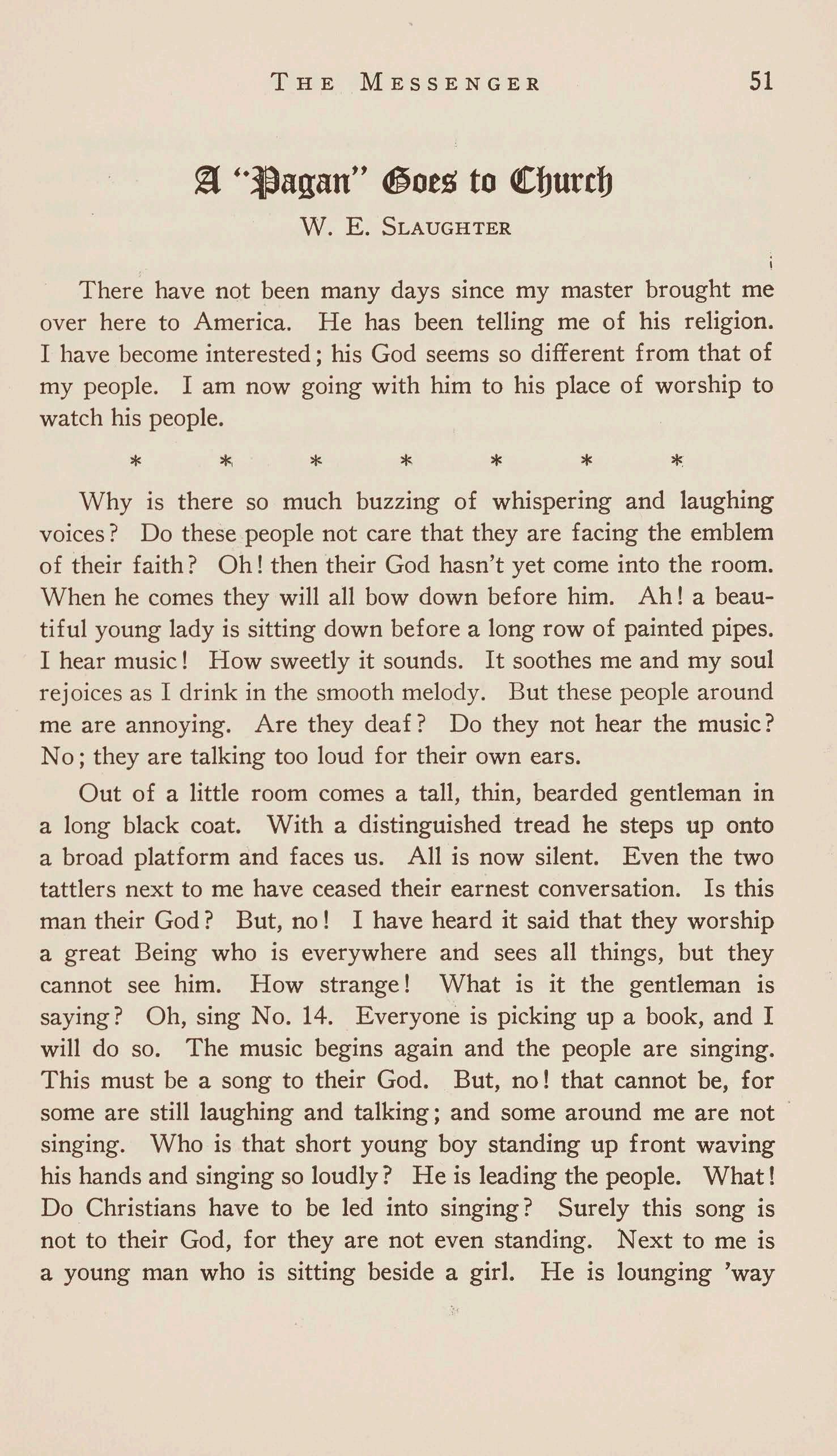
w. E. SLAUGHTER
There have not been many days since my master brought me over here to America. He has been telling me of his religion. I have become interested ; his God seems so different from that of my people. I am now going with him to his place of worship to watch his people.
Why is there so much buzzing of whispering and laughing voices ? Do these people not care that they are facing the emblem of their faith? Oh! then their God hasn't yet come into the room. When he comes they will all bow down before him. Ah! a beautiful young lady is sitting down before a long row of painted pipes. I hear music! How sweetly it sounds. It soothes me and my soul rejoices as I drink in the smooth melody. But these people around me are annoying. Are they deaf? Do they not hear the music? No ; they are talking too loud for their own ears.
Out of a little room comes a tall, thin, bearded gentleman in a long black coat. With a distinguished tread he steps up onto a broad platform and faces us. All is now silent. Even the two tattlers next to me have ceased their earnest conversation. Is this man their God? But, no! I have heard it said that they worship a great Being who is everywhere and sees all things, but they cannot see him. How strange! What is it the gentleman is saying? Oh, sing No. 14. Everyone is picking up a book, and I will do so. The music begins again and the people are singing. This must be a song to their God. But, no! that cannot be, for some are still laughing and talking; and some around me are not · singing. Who is that short young boy standing up front waving his hands and singing so loudly? He is leading the people. What! Do Christians have to be led into singing? Surely this song is not to their God, for they are not even standing. Next to me is a young man who is sitting beside a girl. He is lounging 'way

down in his seat with his legs crossed. And he is holding her hand. They are smiling and cooing like two doves. No ! This song is not to their God. Ah, they have finished. But , no, they are to sing again. Another piece is announced. Pages are turned and, like a catechism, those who sing read their words, apparently void of feeling. But when will they start to worship their God?
The tall man on the platform is reading something from a large book. He is telling about their God. Maybe He will come now. The man in the black coat closes the book and bows his head. Some of the people around me are leaning forward in their seats. The tall man is saying something in a soft kind voice to one he calls "Our Lord and Master." Ah, he is addressing his God. This place is now holy and I am filled with nervous apprehension and expectation. Will their God destroy me for being here? Will he speak back to them ? Listen to all the things the man is asking his God to do for him. And - but wait, I can no longer hear his soft voice. Several young men and girls behind me are giggling and whispering. One of them drops a book. Over there are some folks with their eyes open looking around the vast auditorium. Are they watching for their Lord to appear? I will watch, too. That must be what they call the choir up there. I didn't see all those people in it before. They were late. Why, some of them are talking! This cannot be a prayer to their God, for He would surely destroy them for lack of respect and fear of Him. My people prostrate themselves humbly before their idols, even on muddy and damp ground. They fear their gods. None of us would dare turn an eye but towards them. But with whom can the man be talking? Folks around me are getting restless and some are again sitting erect in their seats. But now the speaker has finished.
Four men from the group they call the choir are stepping up to the railing. The music commences again. They sing. Eight lazy men shuffle past me down the aisle two abreast. Where are they going? They stop before the man on the platform, who is bowing his head and holding metal plates. He closes his eyes and speaks. Around me is · heard the muffled jingling of pocketed
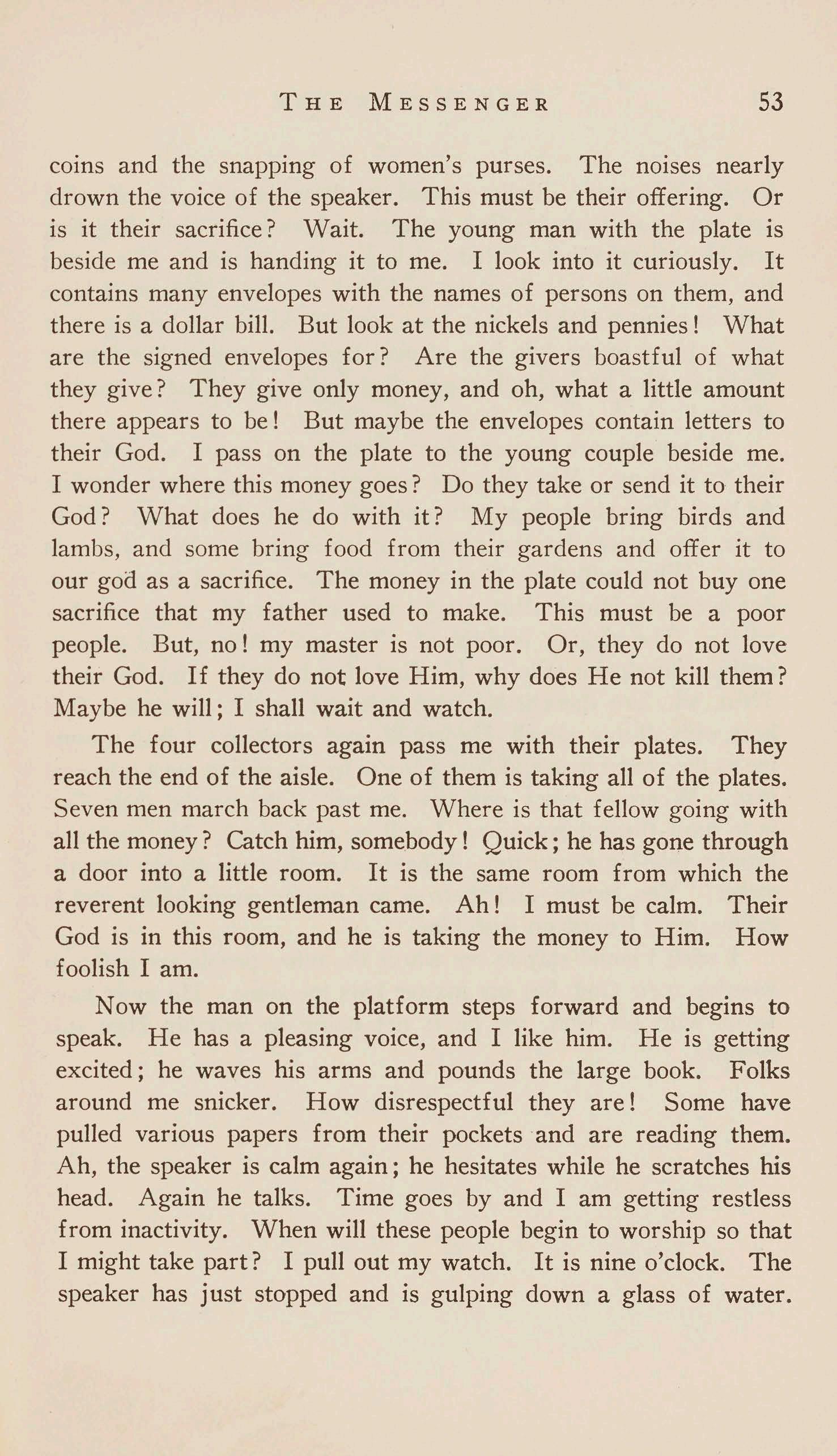
coins and the snapping of women's purses. The noises nearly drown the voice of the speaker. This must be their offering. Or is it their sacrifice? Wait. The young man with the plate is beside me and is handing it to me. I look into it curiously. It contains many envelopes with the names of persons on them, and there is a dollar bill. But look at the nickels and pennies! What are the signed envelopes for? Are the givers boastful of what they give? They give only money, and oh, what a little amount there appears to be! But maybe the envelopes contain letters to their God. I pass on the plate to the young couple beside me. I wonder where this money goes? Do they take or send it to their God? What does he do with it? My people bring birds and lambs, and some bring food from their gardens and offer it to our god as a sacrifice. The money in the plate could not buy one sacrifice that my father used to make. This must be a poor people. But, no! my master is not poor. Or, they do not love their God. If they do not love Him, why does He not kill them? Maybe he will; I shall wait and watch.
The four collectors again pass me with their plates. They reach the end of the aisle. One of them is taking all of the plates. Seven men march back past me. Where is that fell ow going with all the money? Catch him, somebody ! Quick; he has gone through a door into a little room. It is the same room from which the reverent looking gentleman came. Ah ! I must be calm. Their God is in this room, and he is taking the money to Him. How foolish I am.
Now the man on the platform steps forward and begins to speak. He has a pleasing voice, and I like him. He is getting excited; he waves his arms and pounds the large book. Folks around me snicker. How disrespectful they are! Some have pulled various papers from their pockets and are reading them. Ah, the speaker is calm again; he hesitates while he scratches his head. Again he talks. Time goes by and I am getting restless from inactivity. When will these people begin to worship so that I might take part? I pull out my watch. It is nine o'clock. The speaker has just stopped and is gulping down a glass of water.

I guess it is water. Folks around me draw deep breaths of relief and put away their reading matters; others cease their fidgeting and become attentive. What is going to happen now? The young boy next to me is telling the girl that the "old bird must have lost his notes tonight." But I see several old women wiping their eyes. Here to my left is a woman trying to arouse her drowsy husband who has slept through the speaking. What a peculiar service!
Ah, now we are to sing again. I know this hymn; a missionary taught it to me. Yes; they are now going to begin their worship. At last! Everybody is standing and all seem to be singing. Wait, there are some who are putting on their coats. Will they not stay? What will their God do when they are not here to bow down before Him? But maybe the real worship is to be elsewhere. The singing is finished. The tall gentleman is praying again. Surely he talks to his God, for he calls Him by name. Then, why are these babbling people not quiet? Can their God hear with all this noise? He has stopped speaking. I look around me as the young man and lady squeeze by me, giving me a quizzical grin. Where is every one now going? Oh! maybe their God is to meet them downstairs. I will go with them. My master is leaving this big room, too. What? Are they going out into the street? Yes, surely, and there is my master going home, and is calling me. I must go with him.
I wish I could stay to see where the other people are going to worship their God, but my master bids me come. He must have favor with his God, for he is not going to worship Him this evemng.